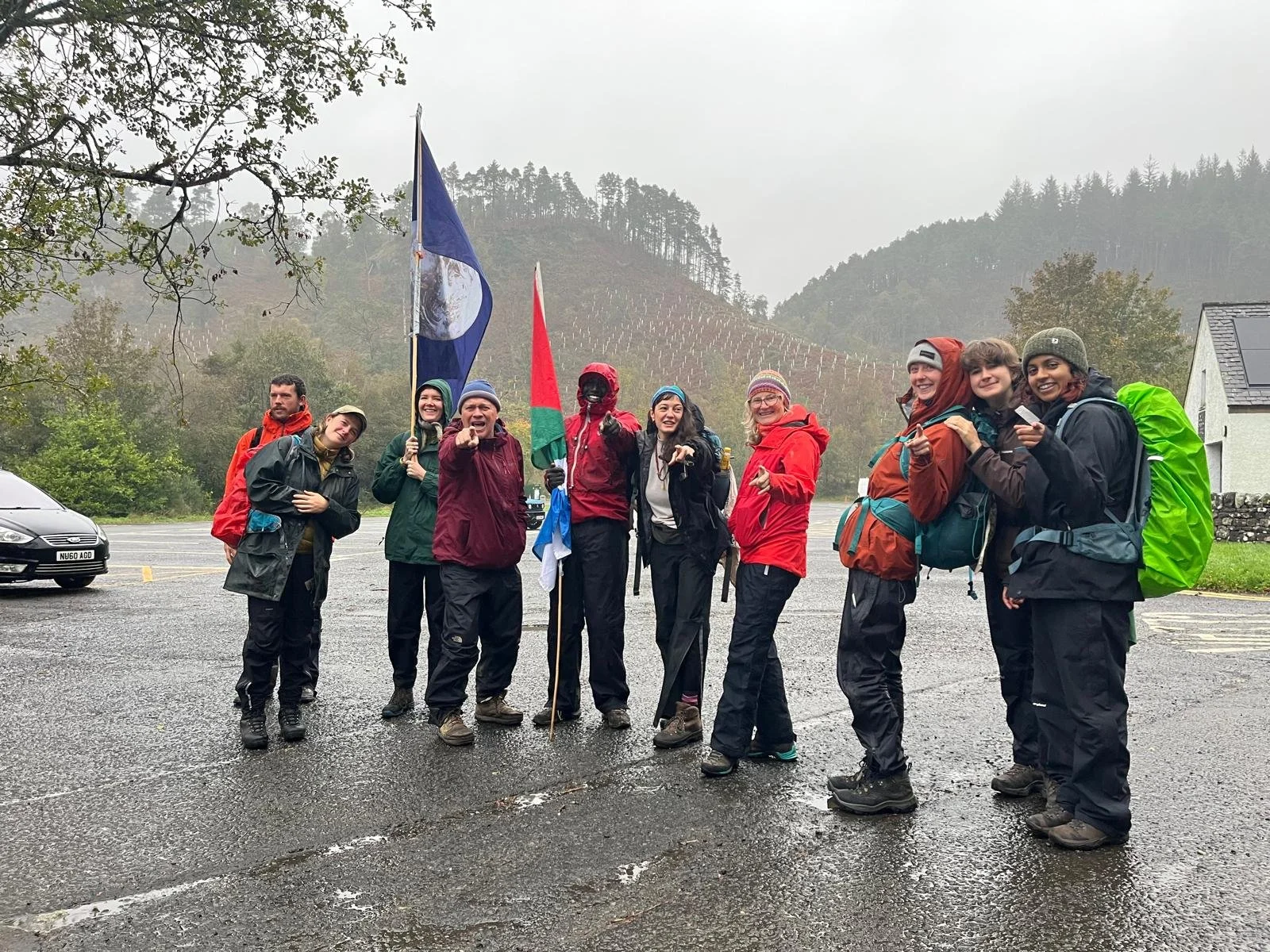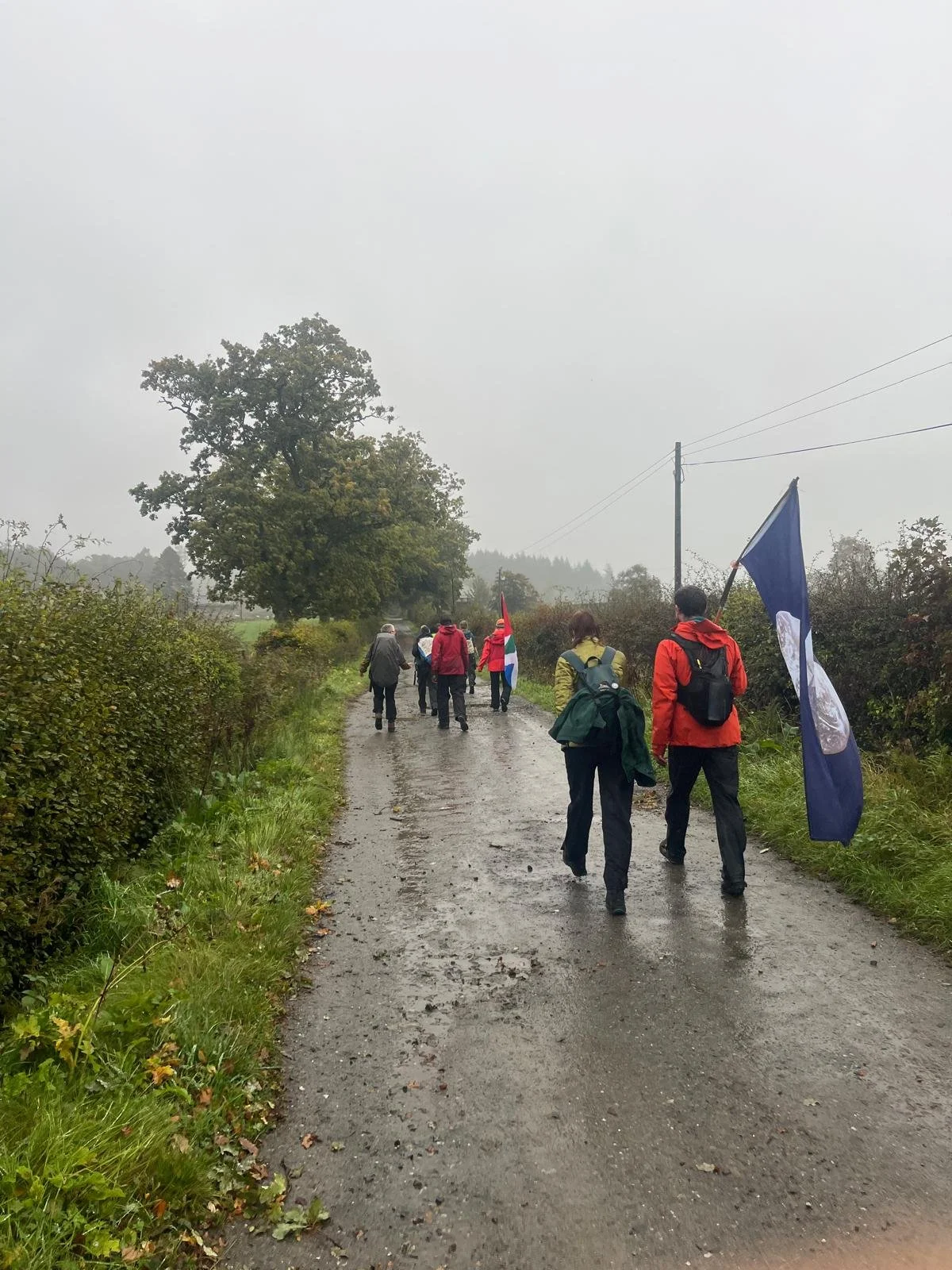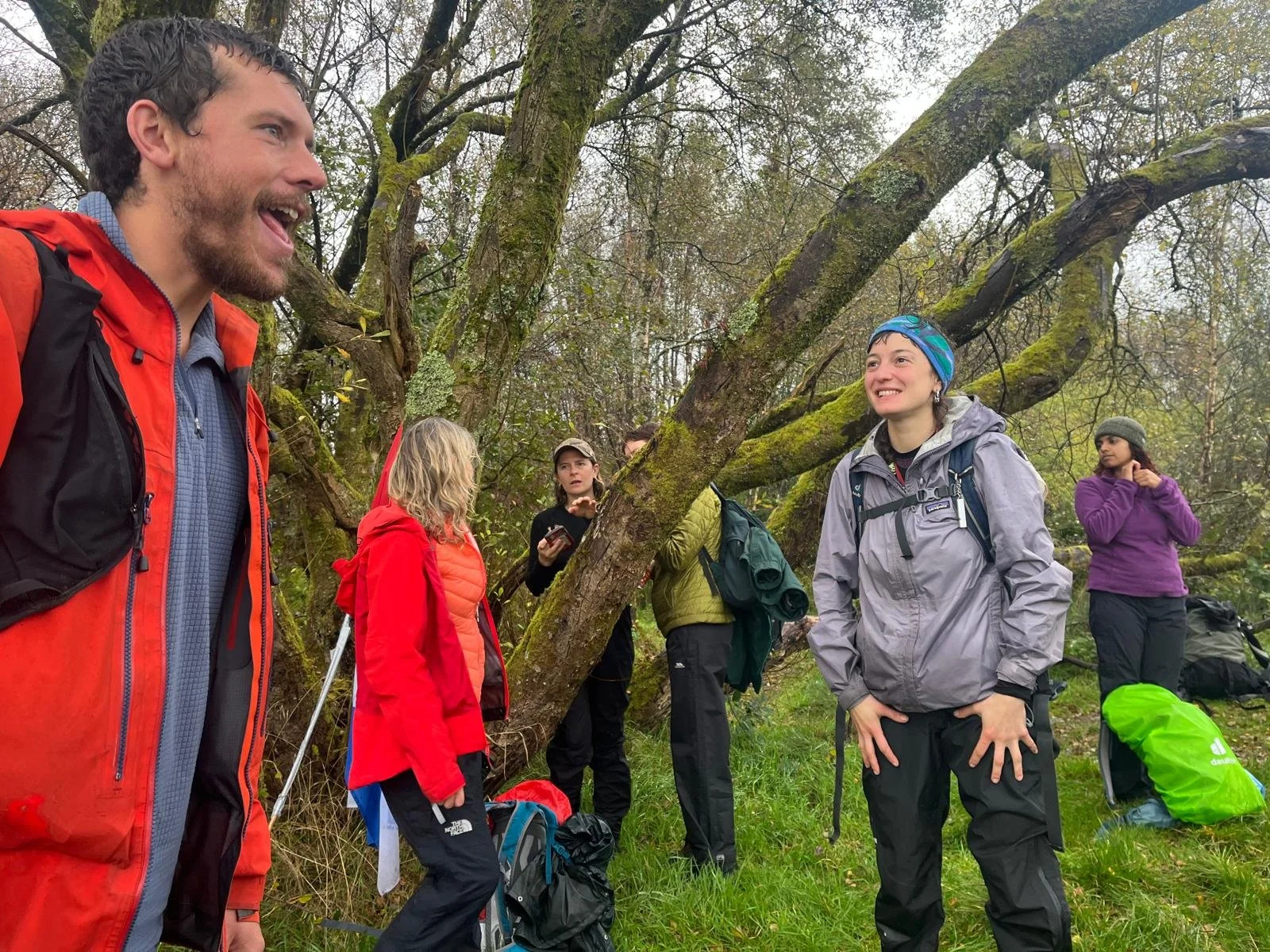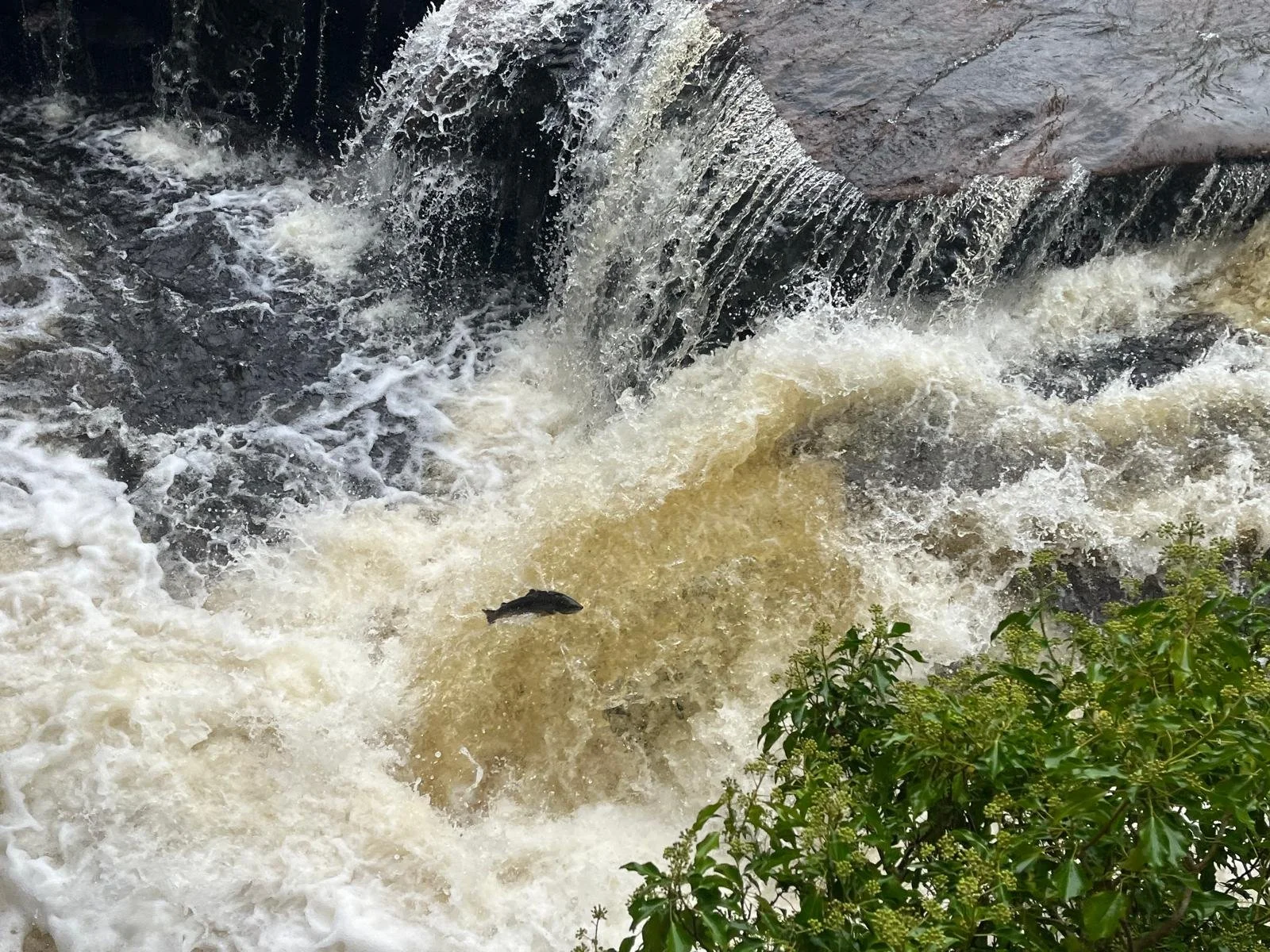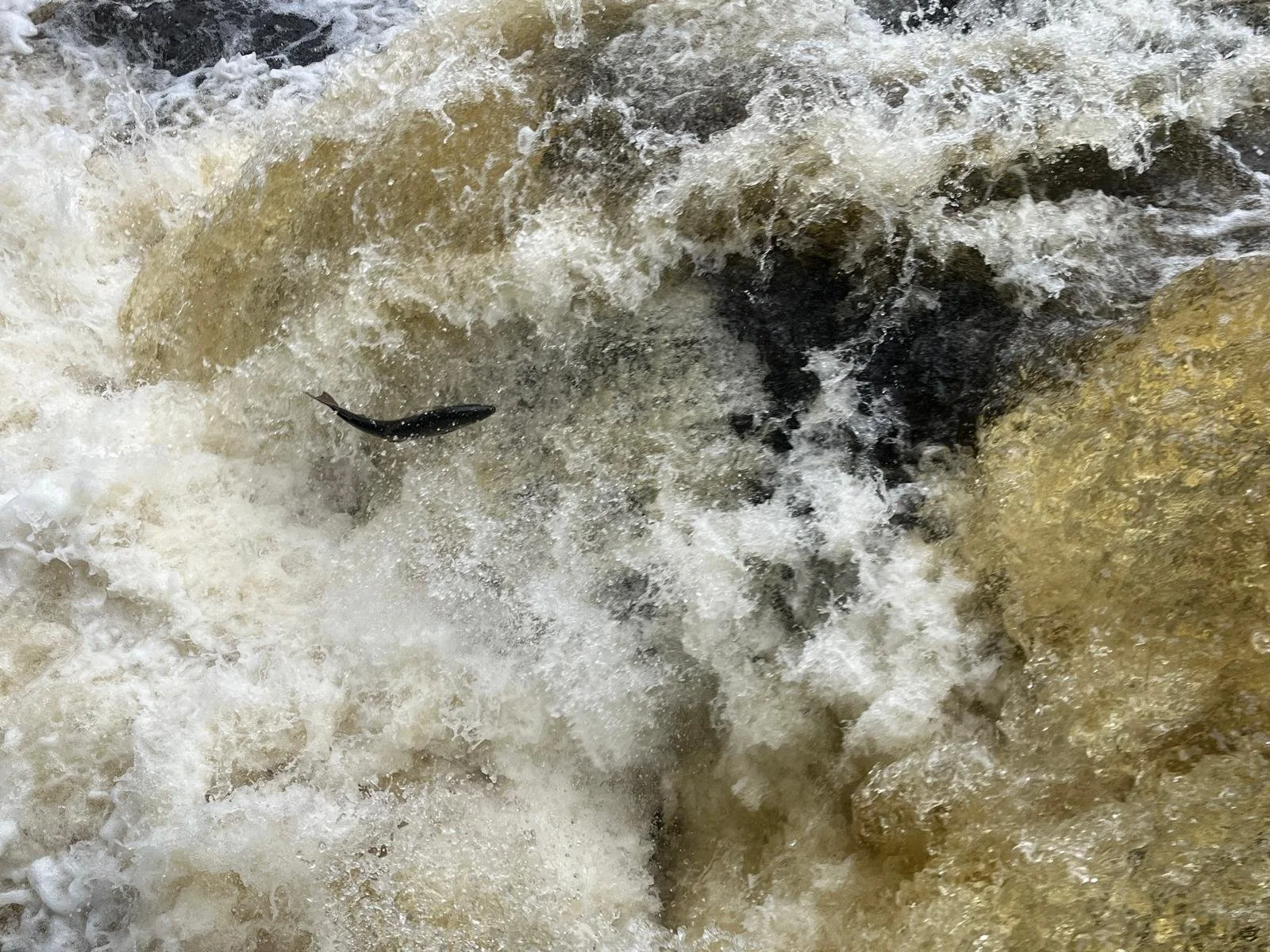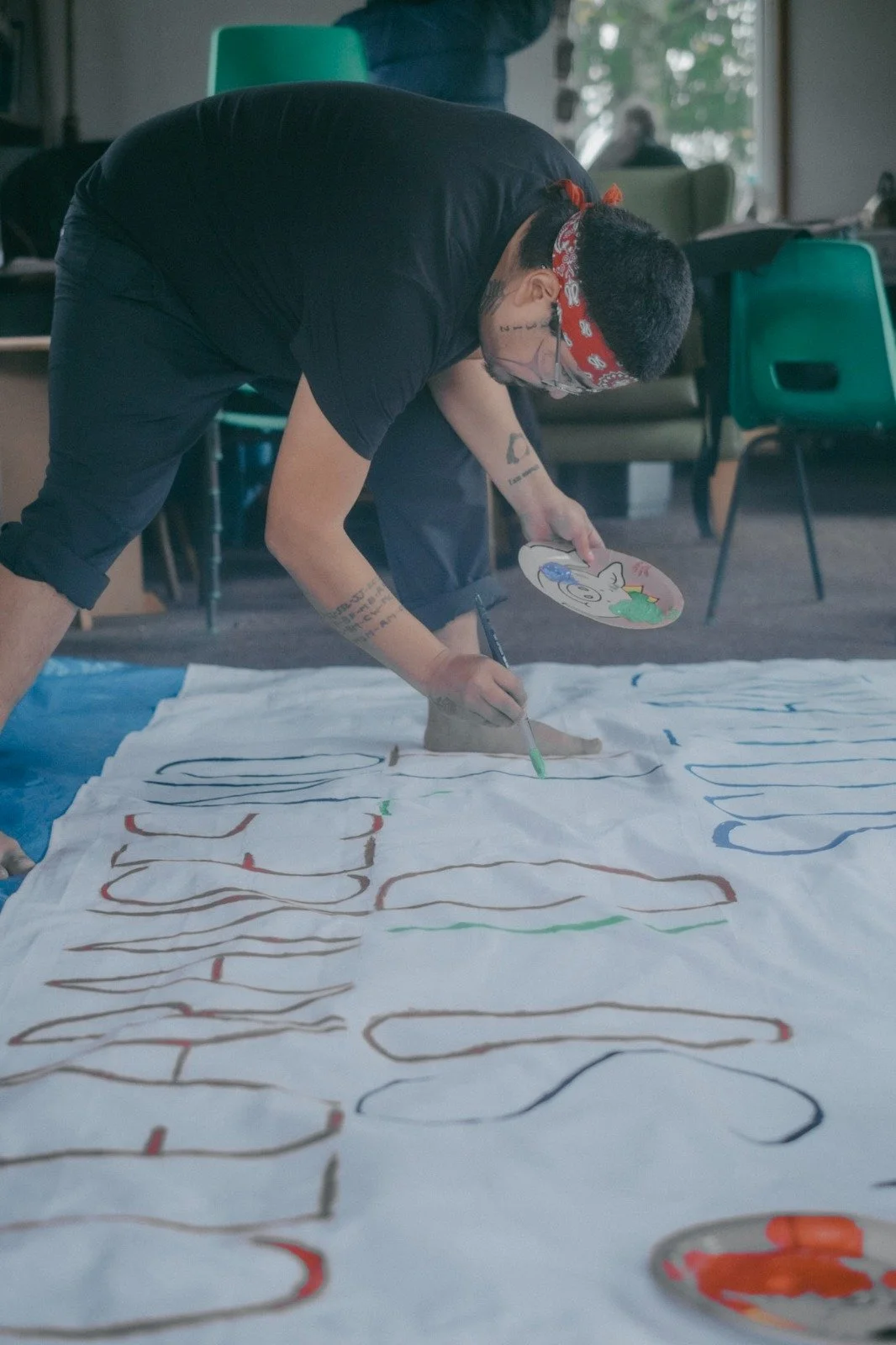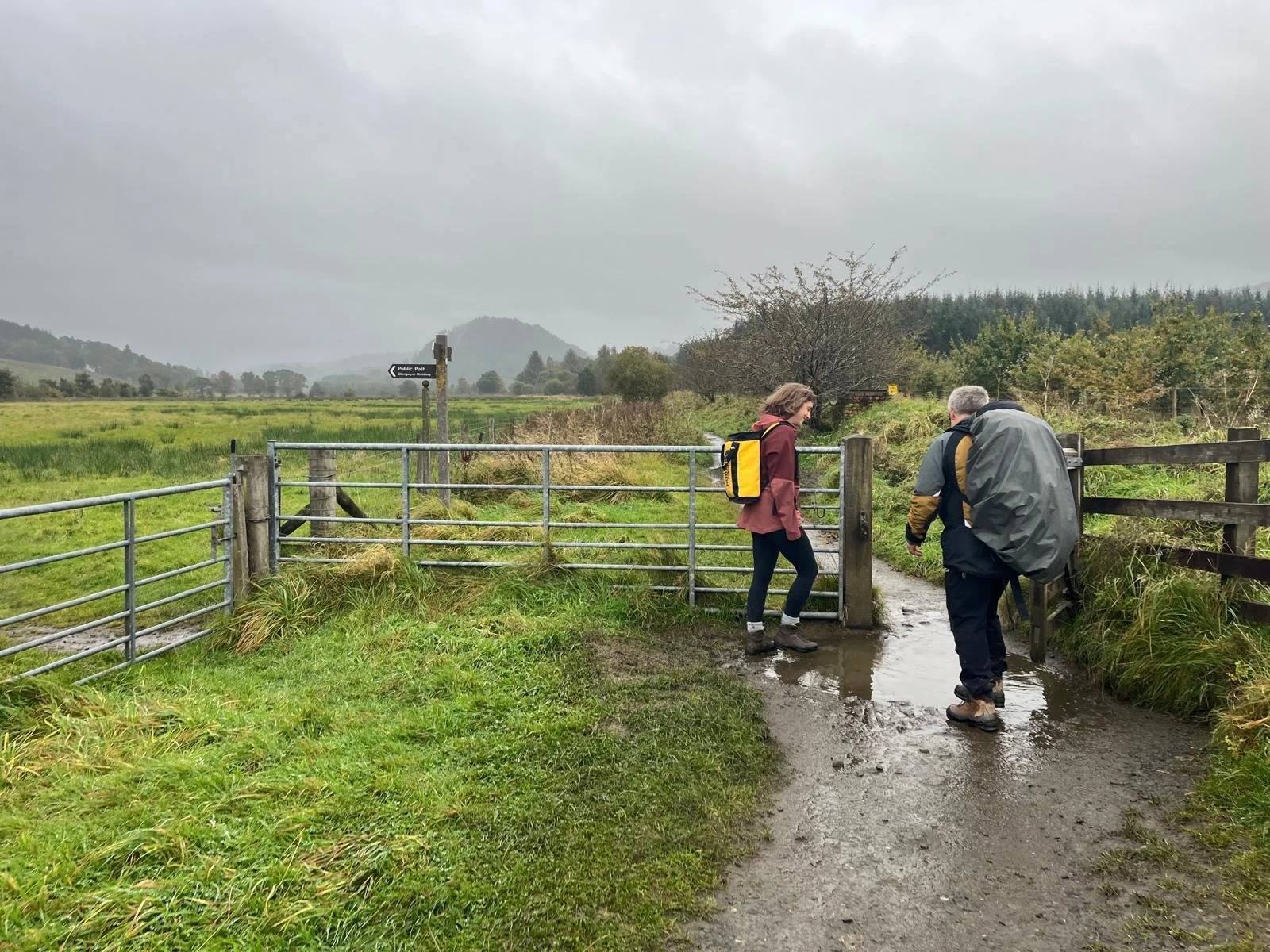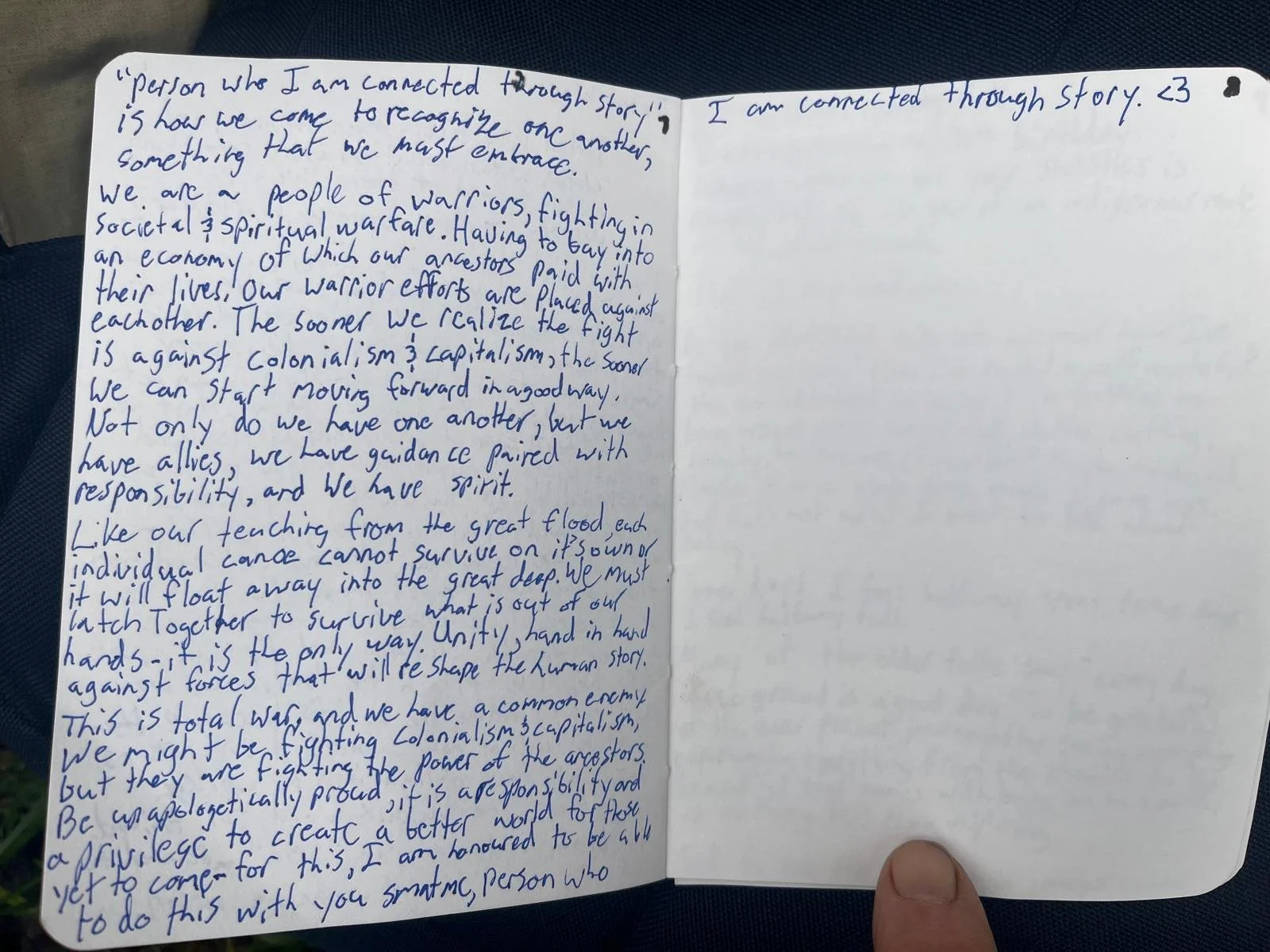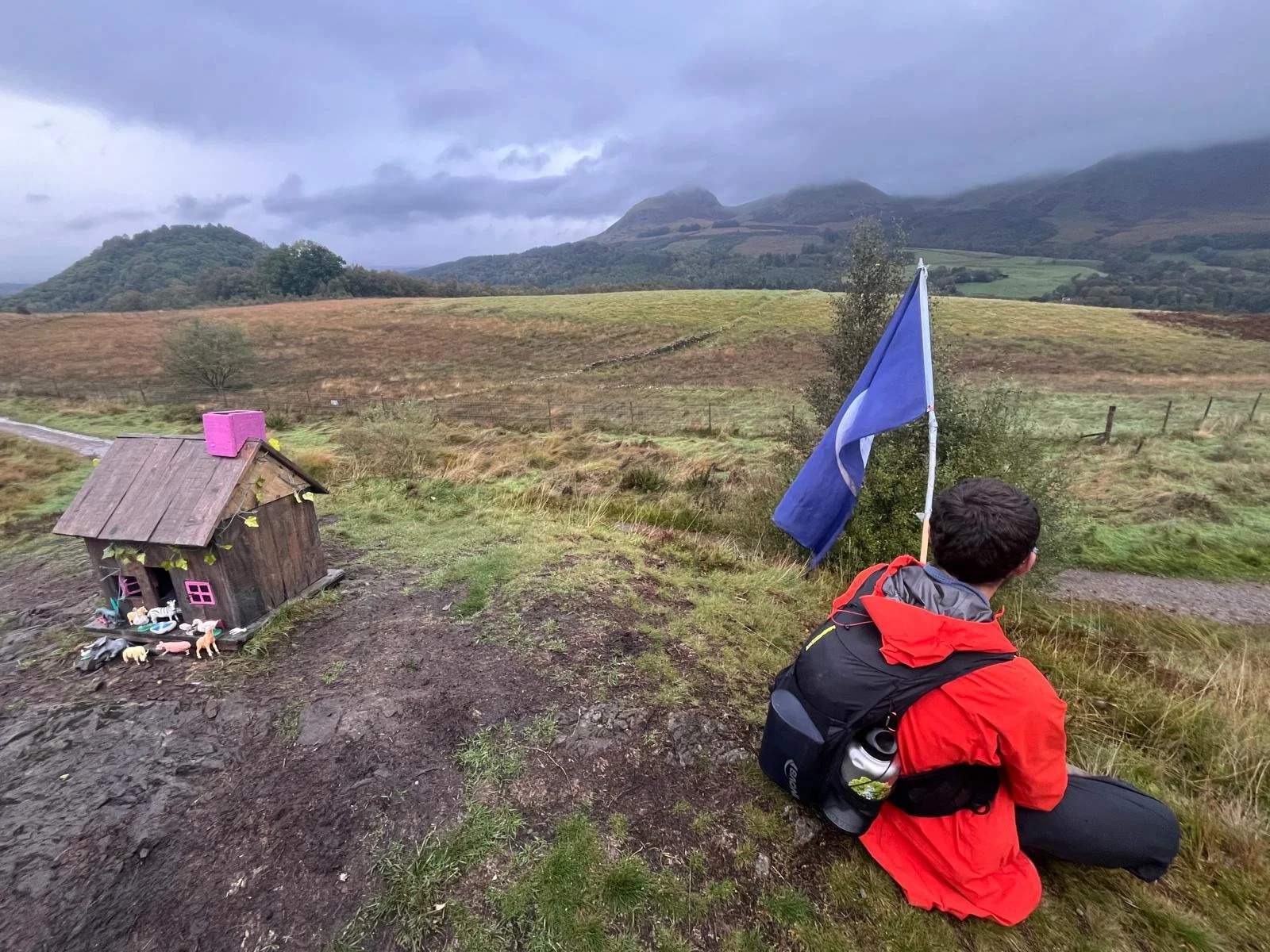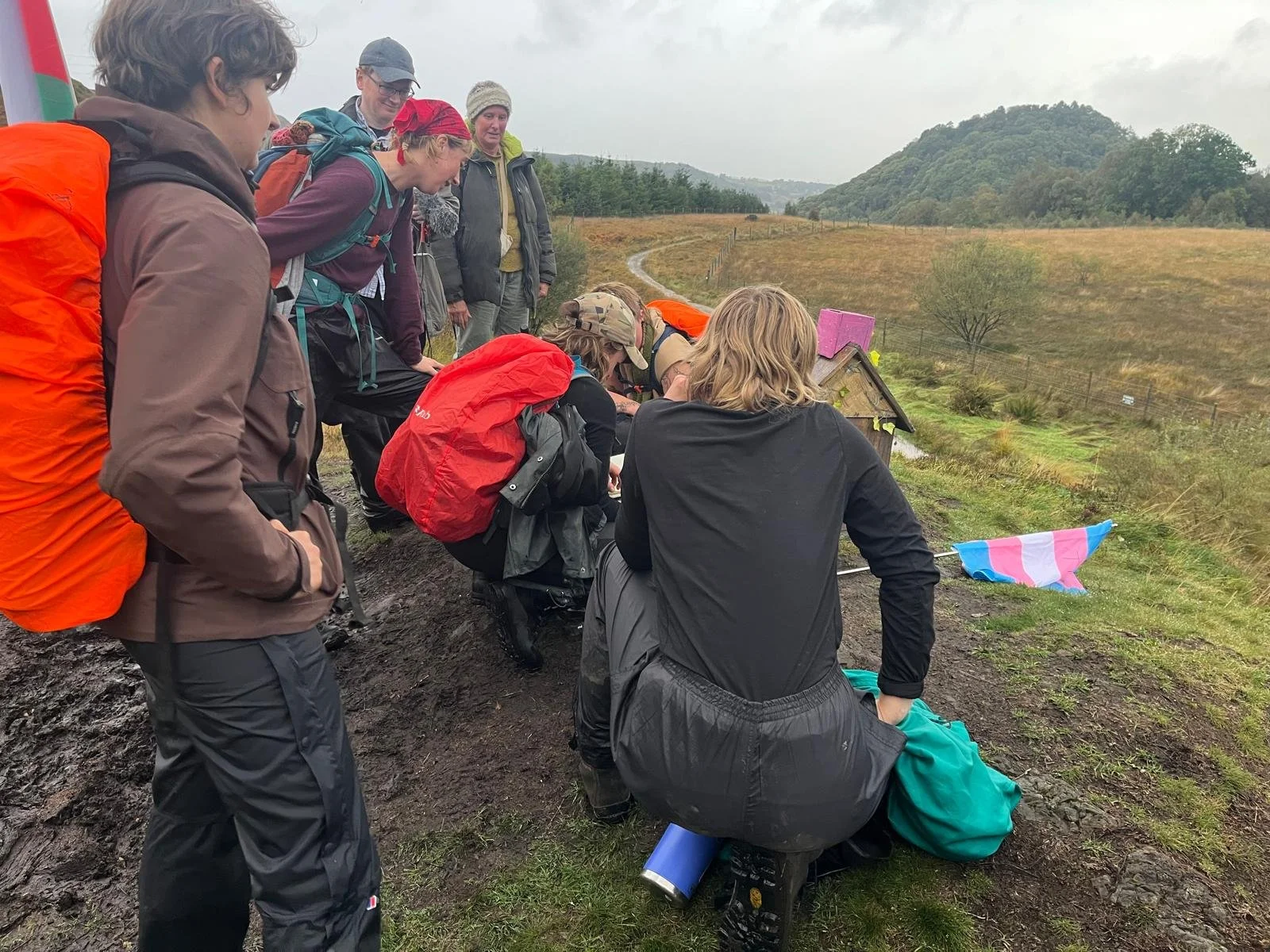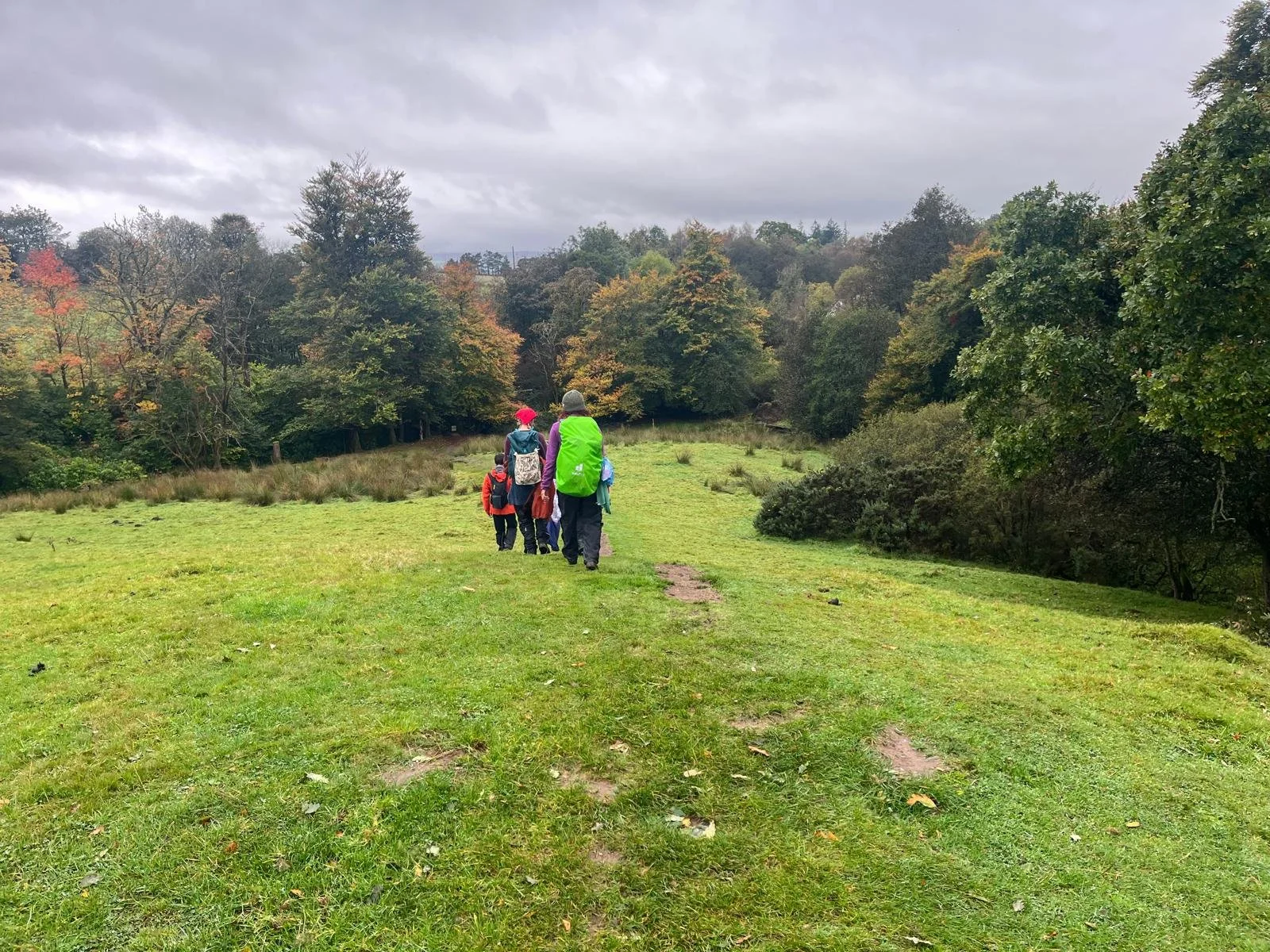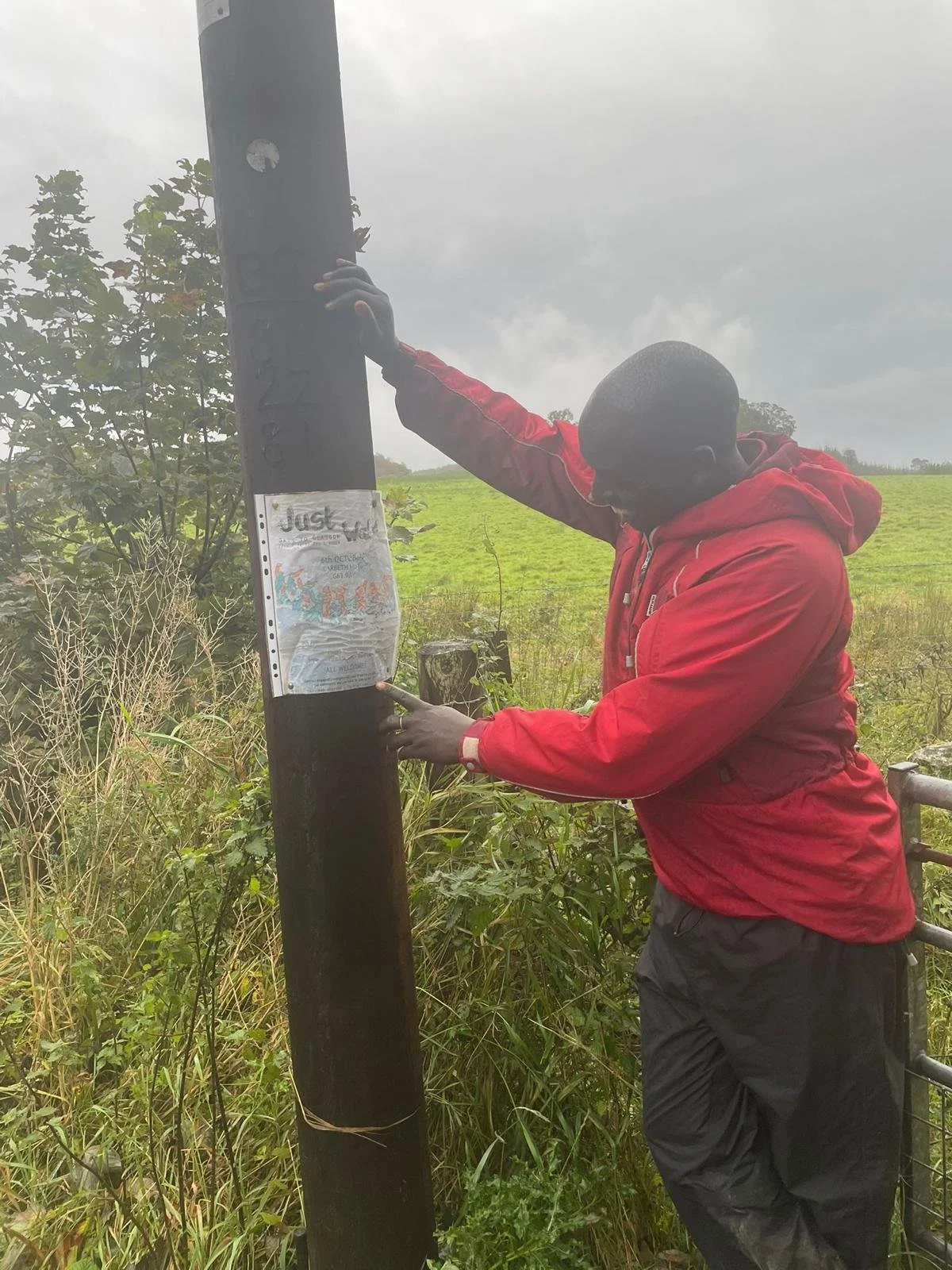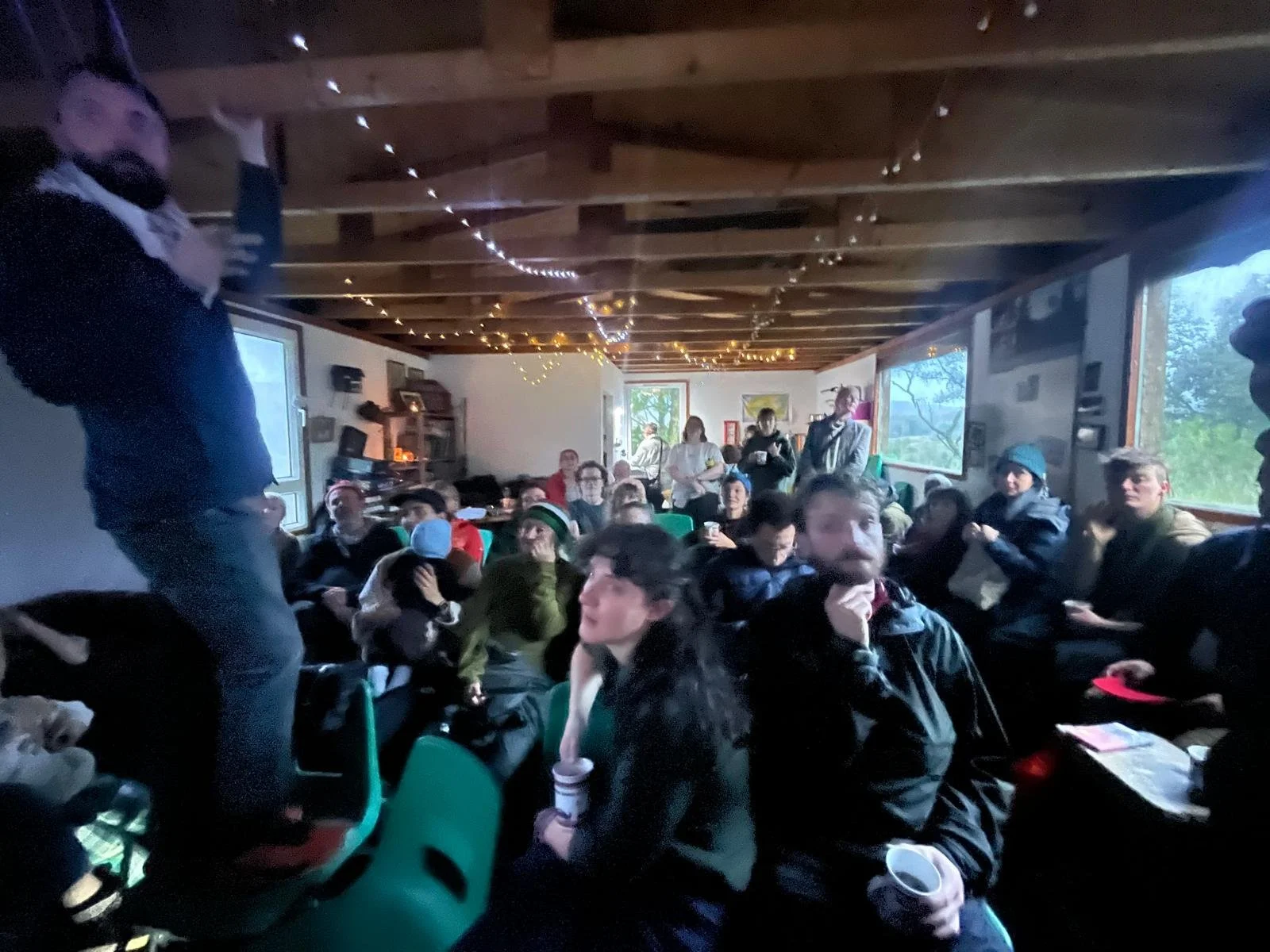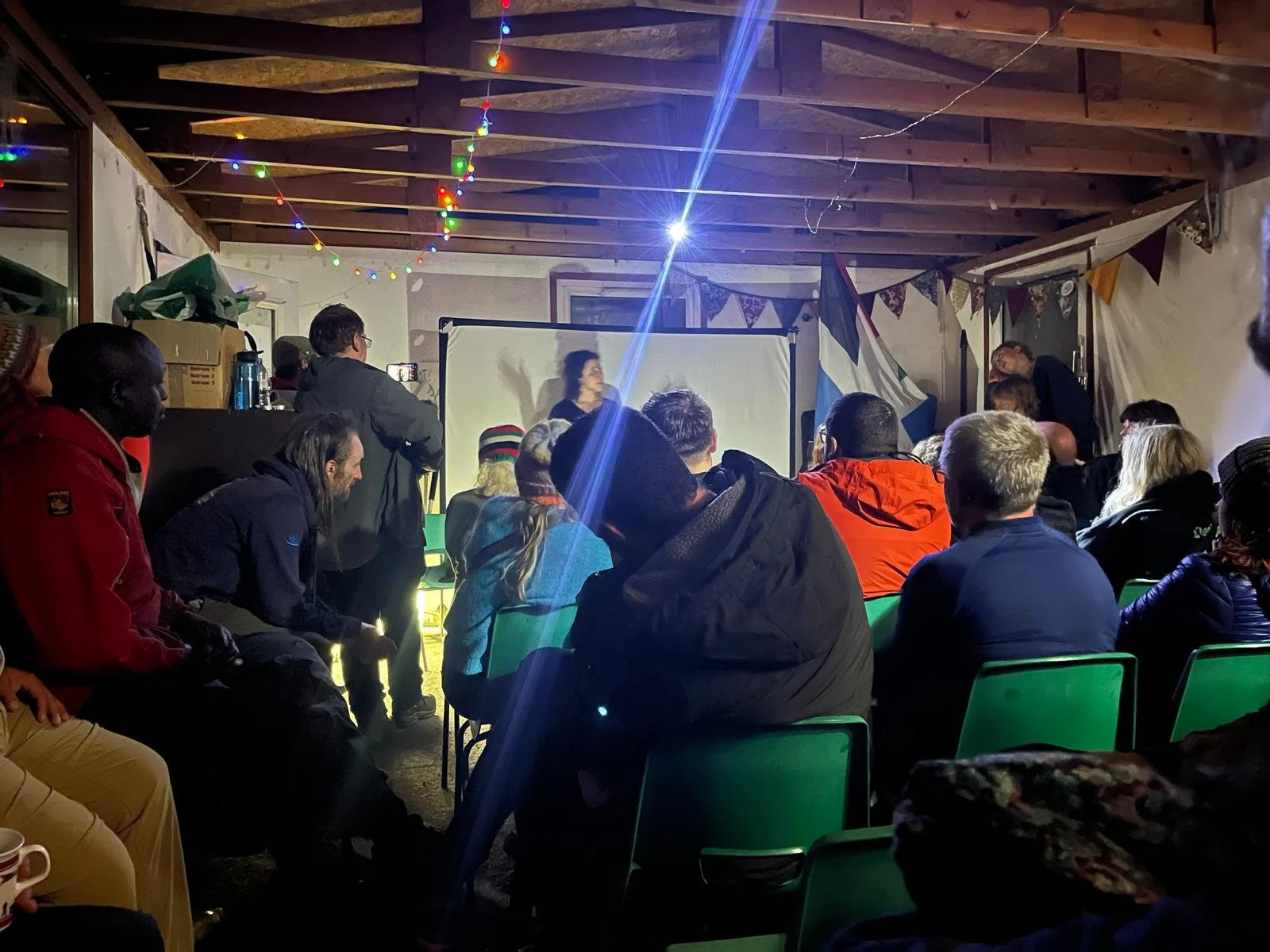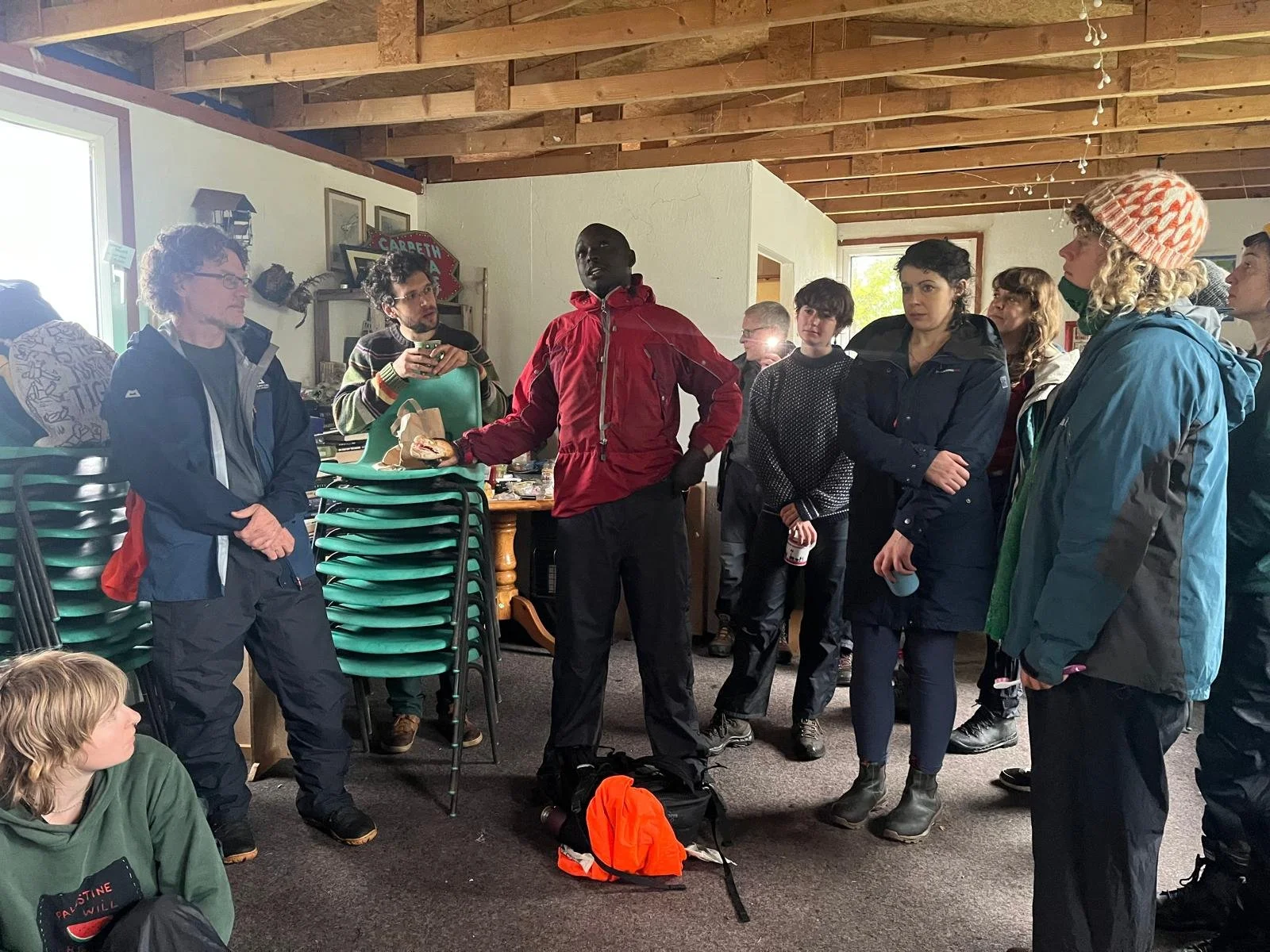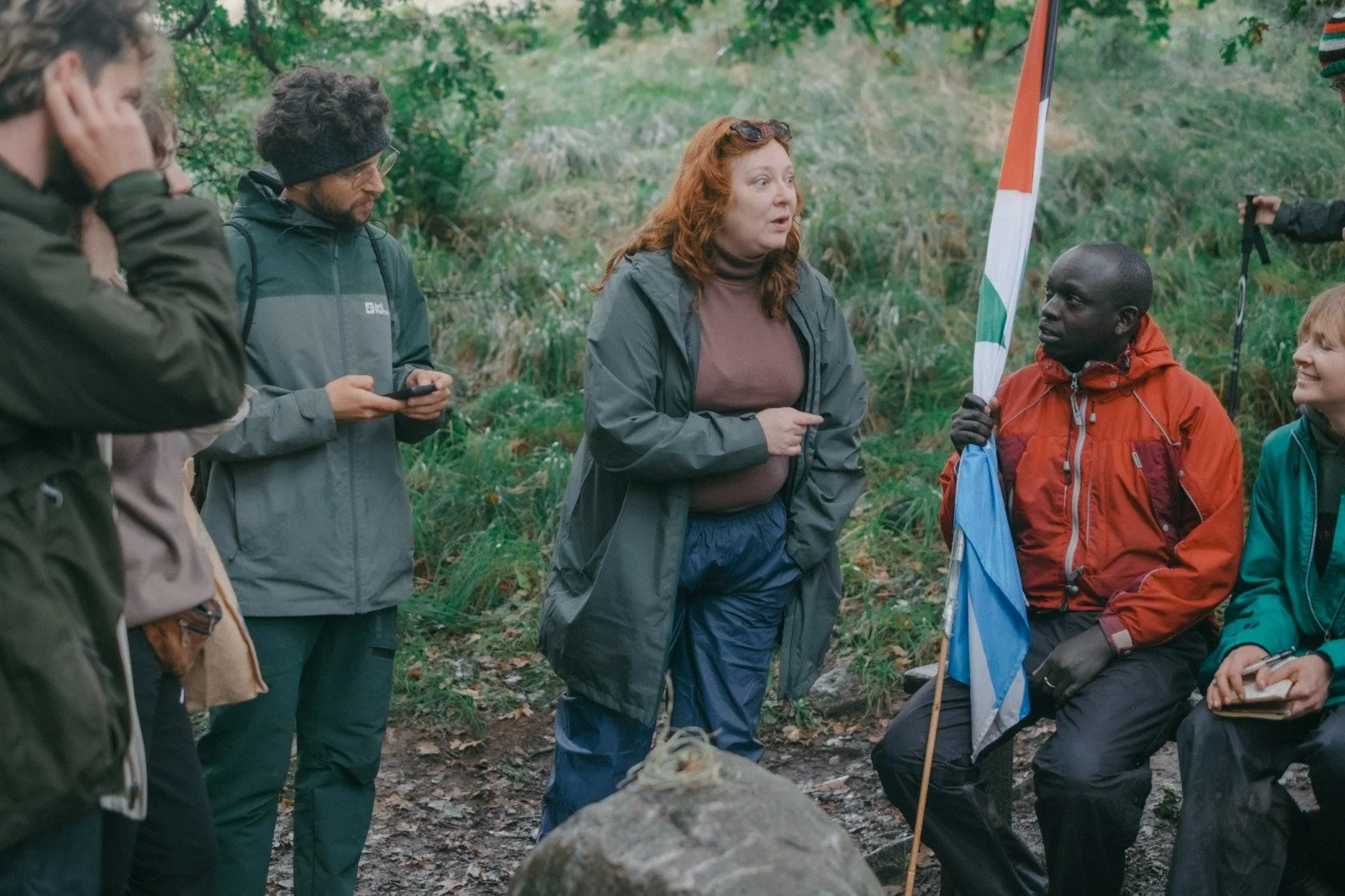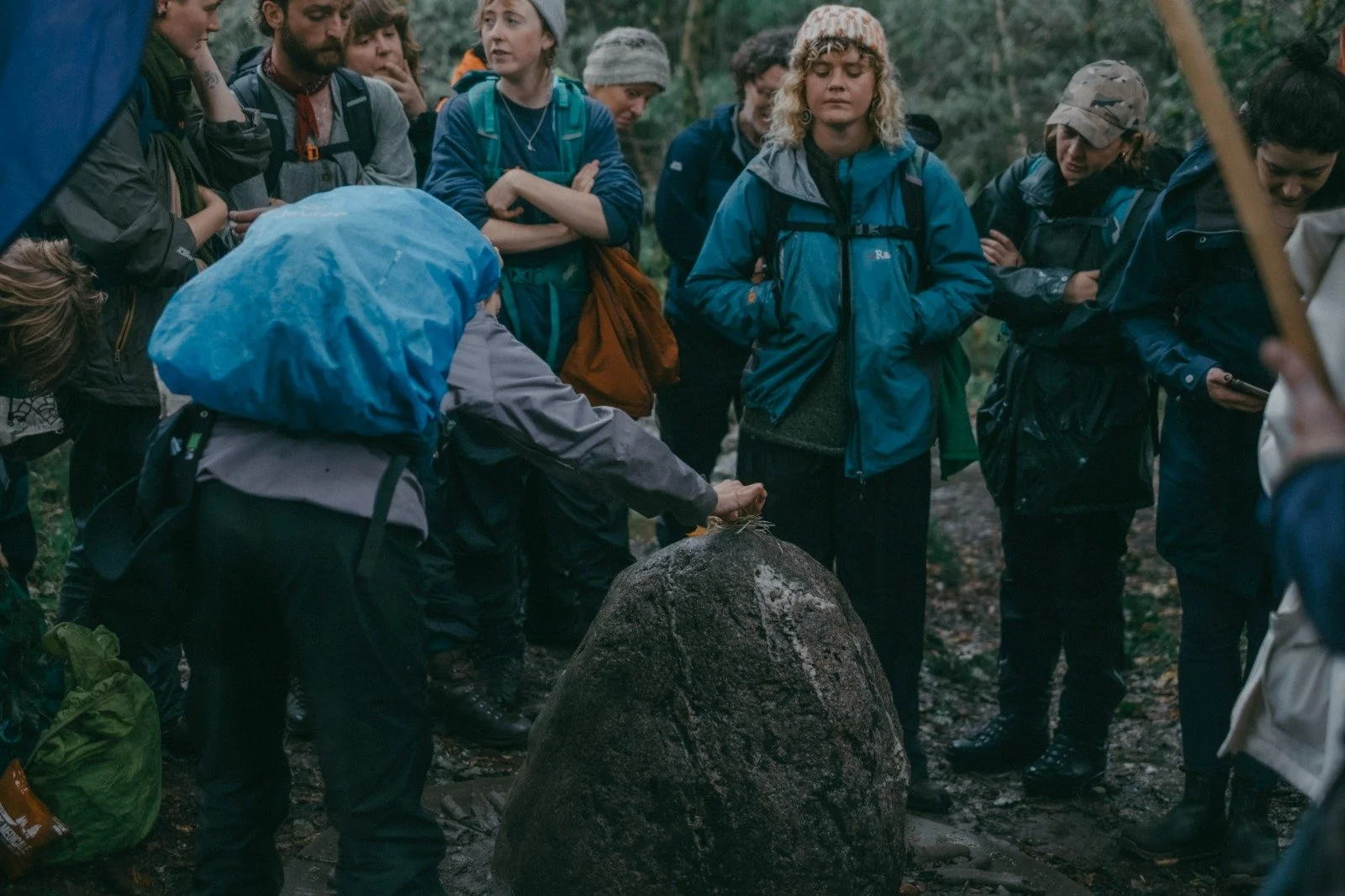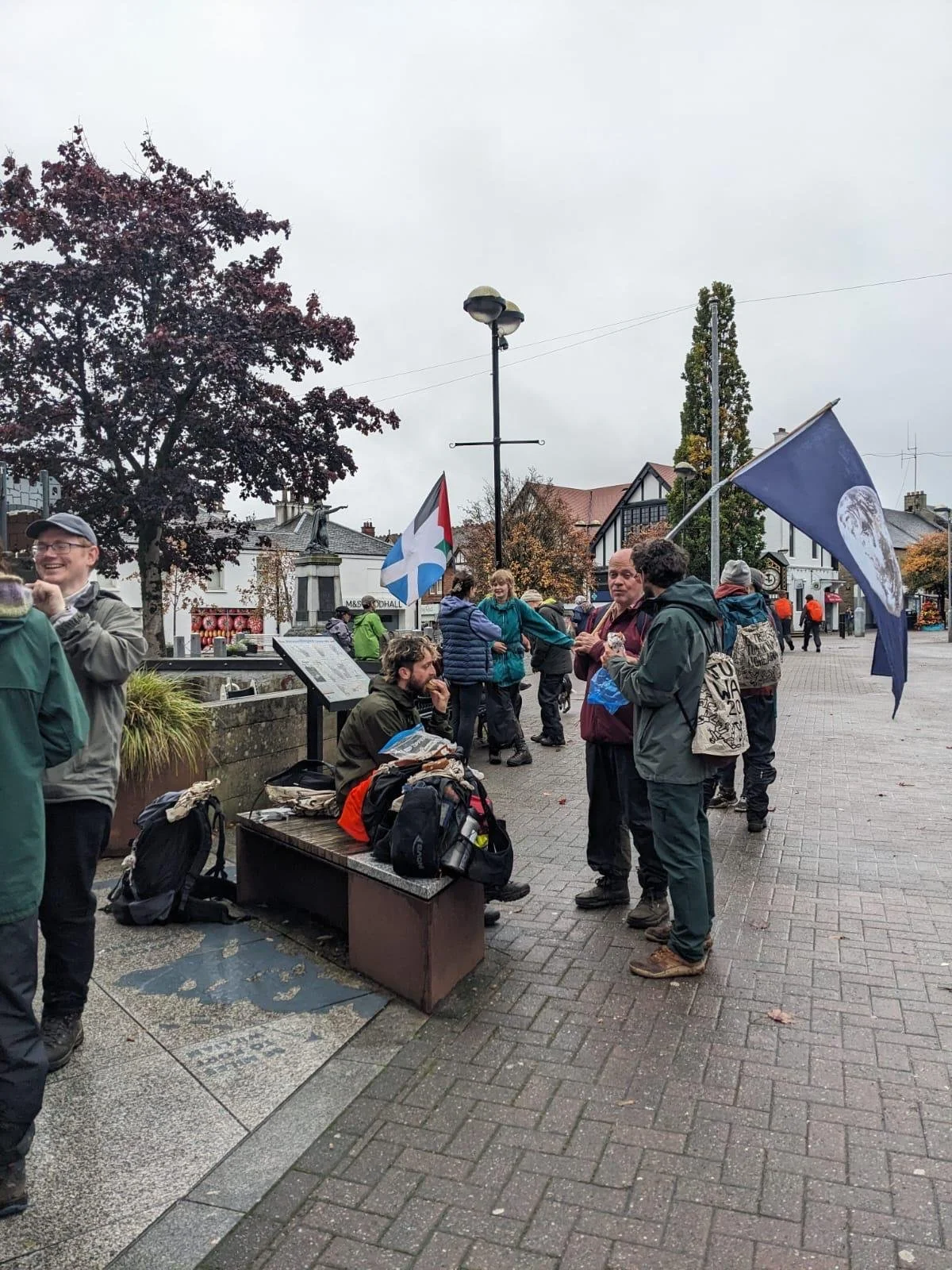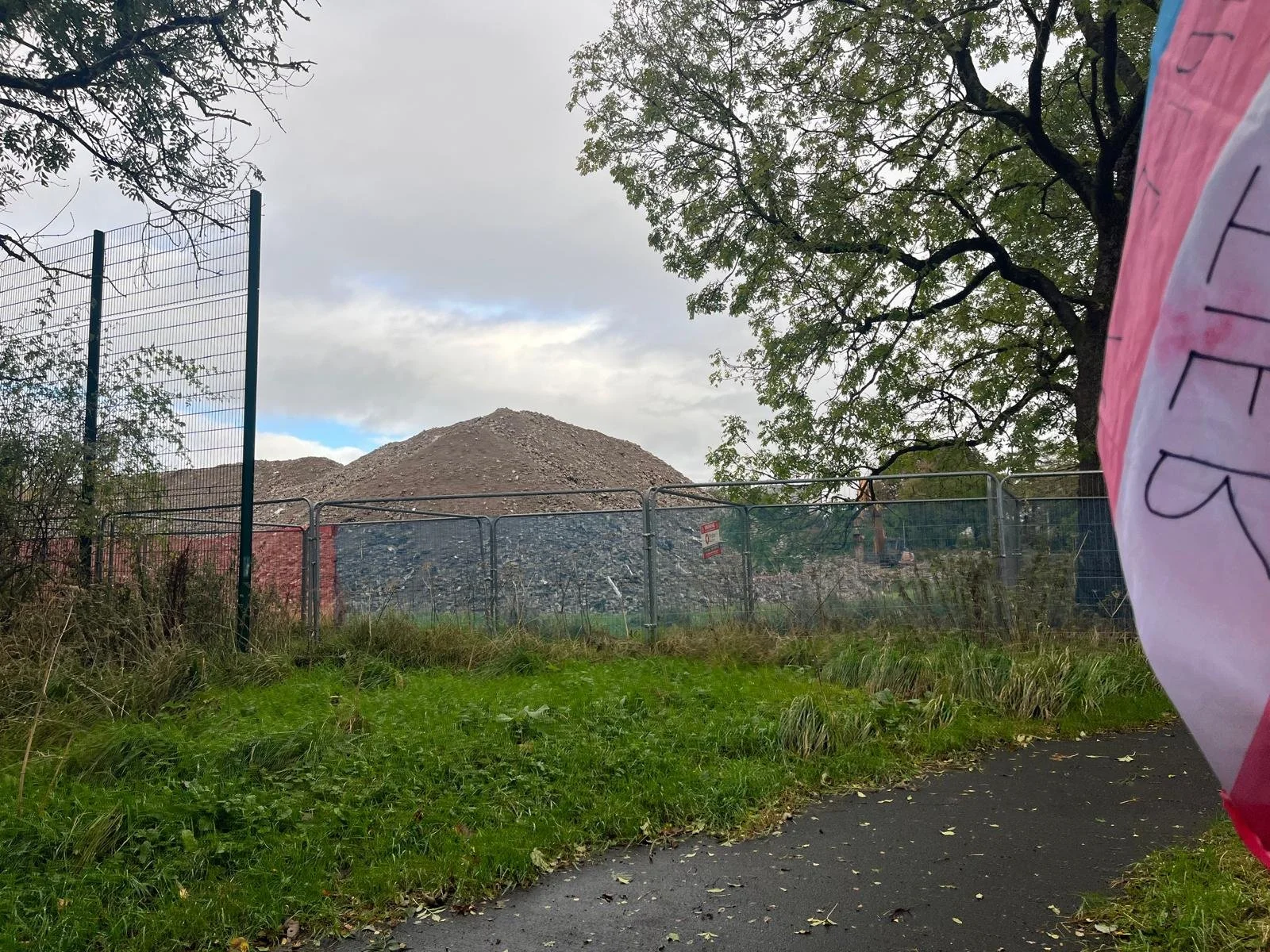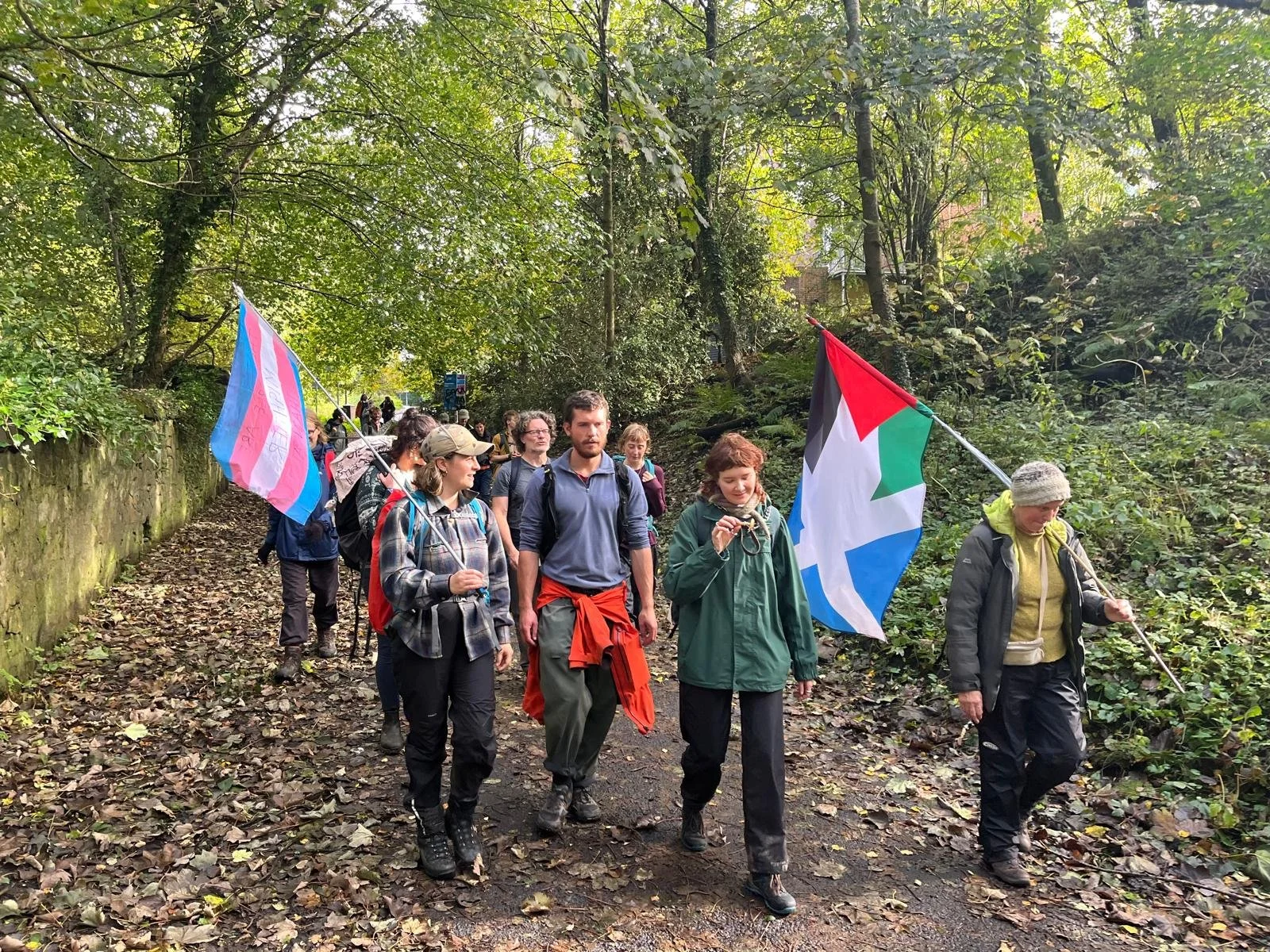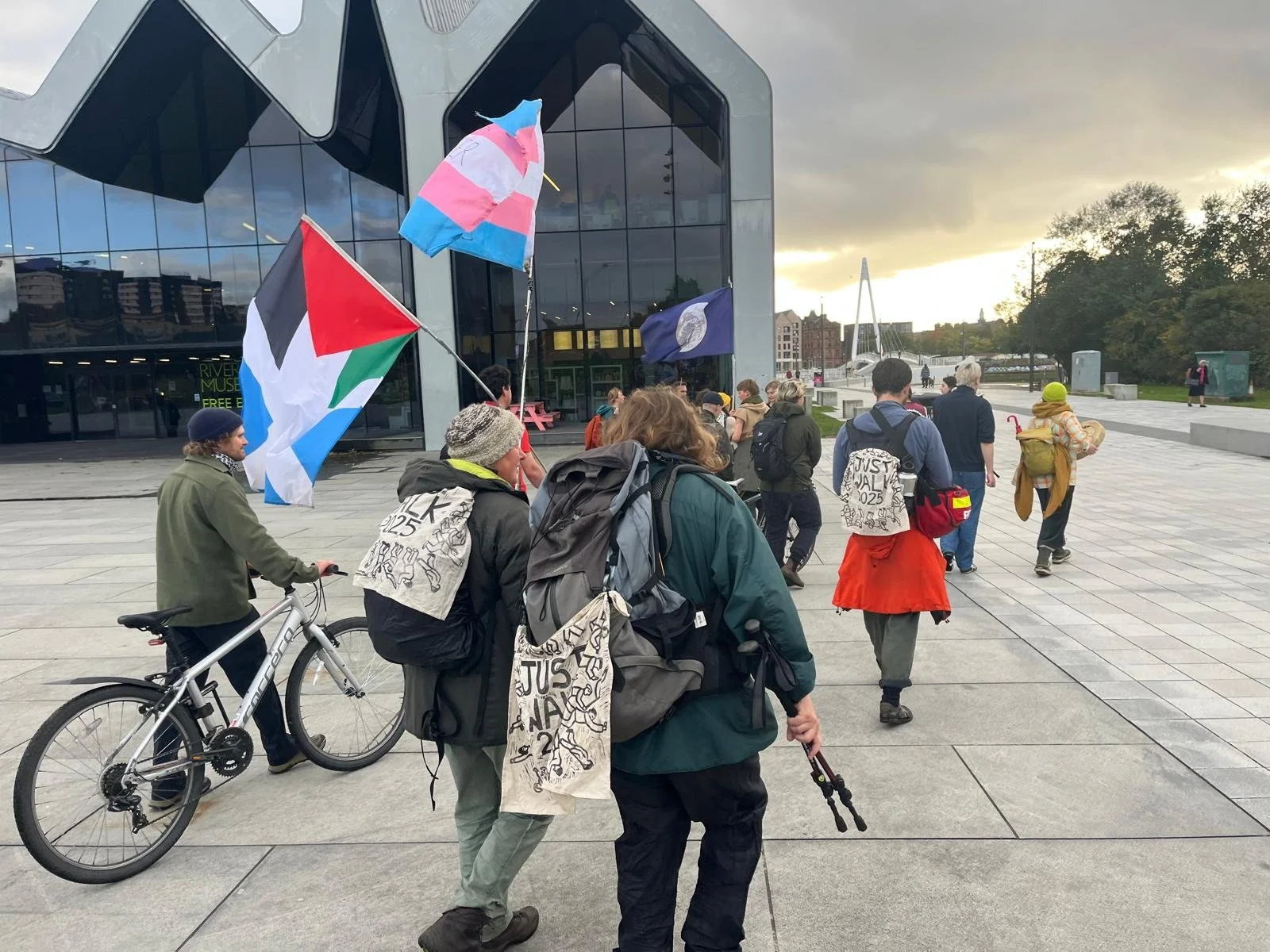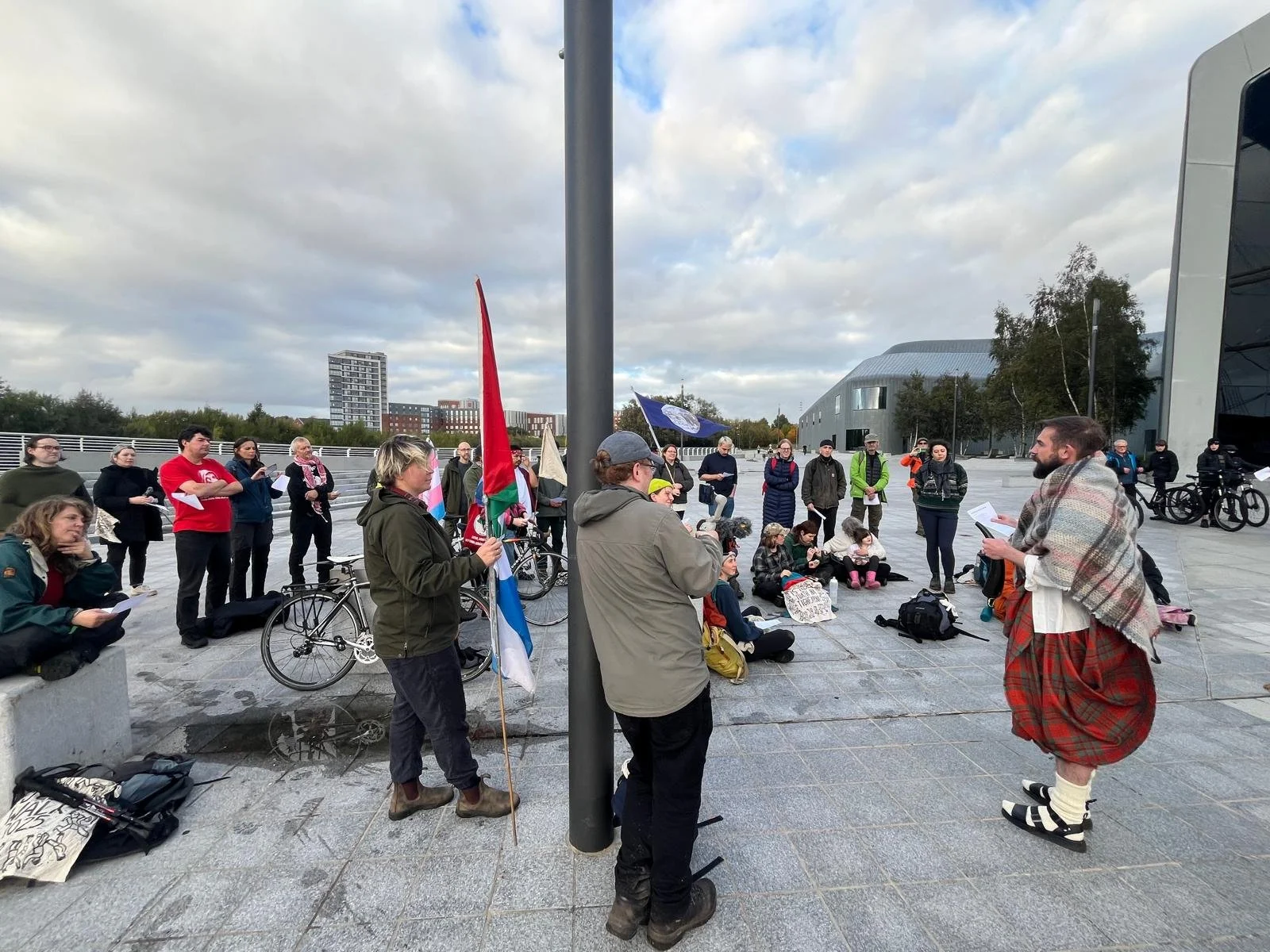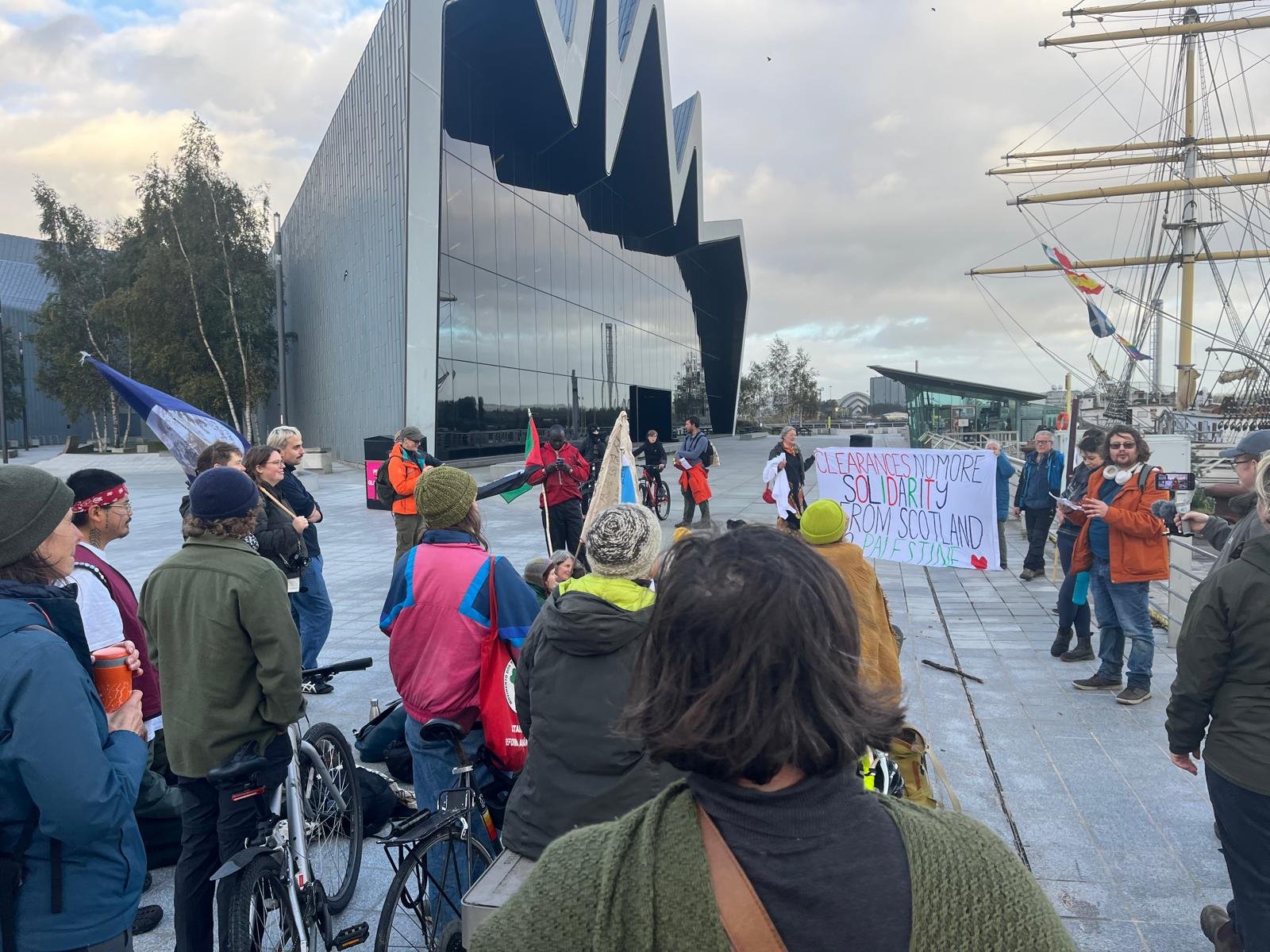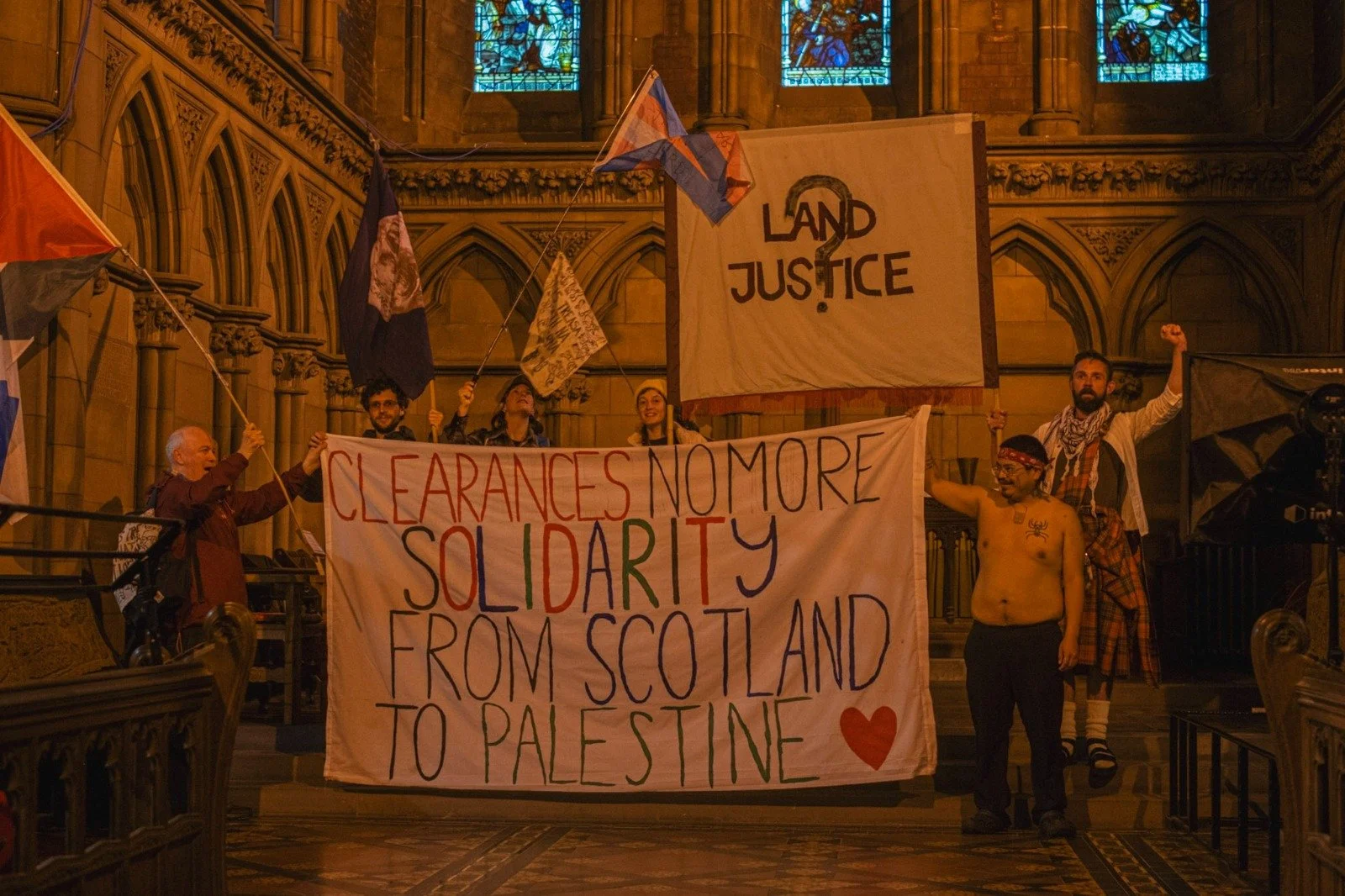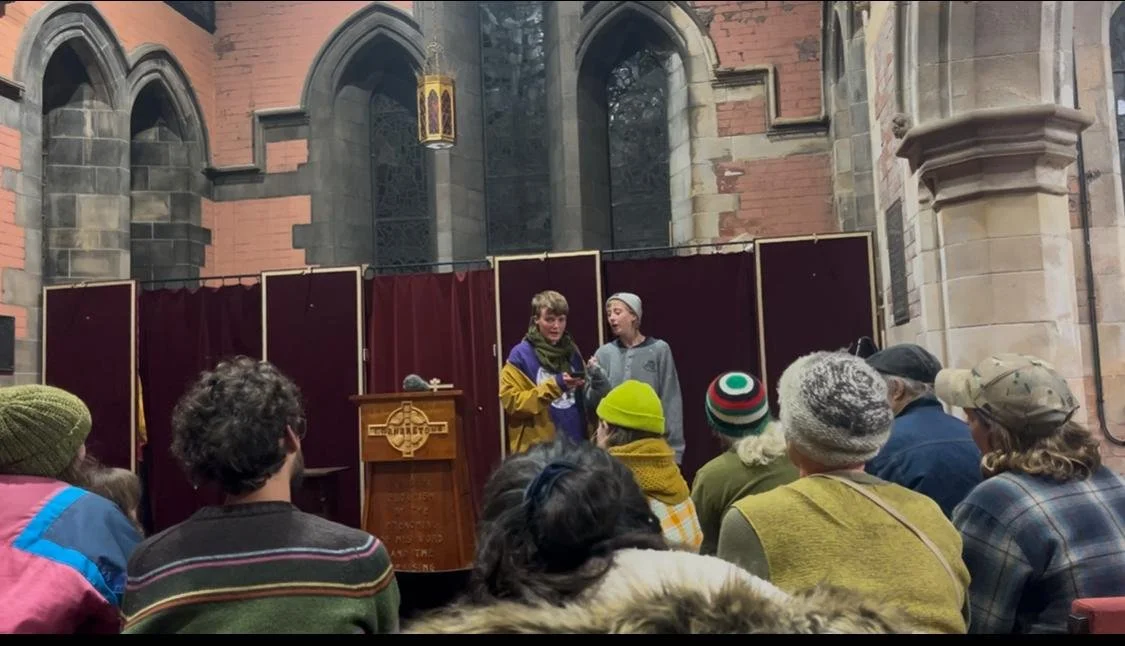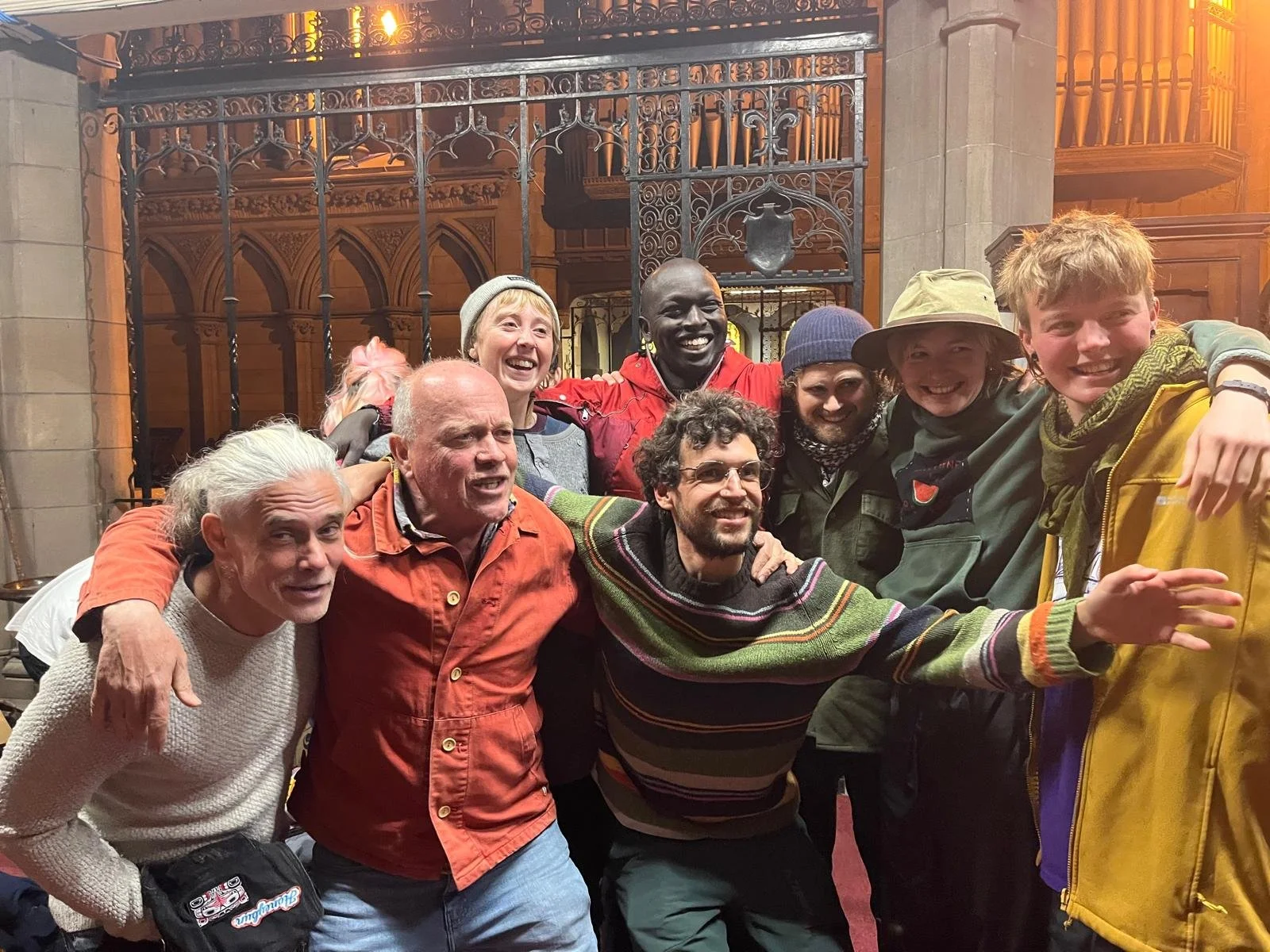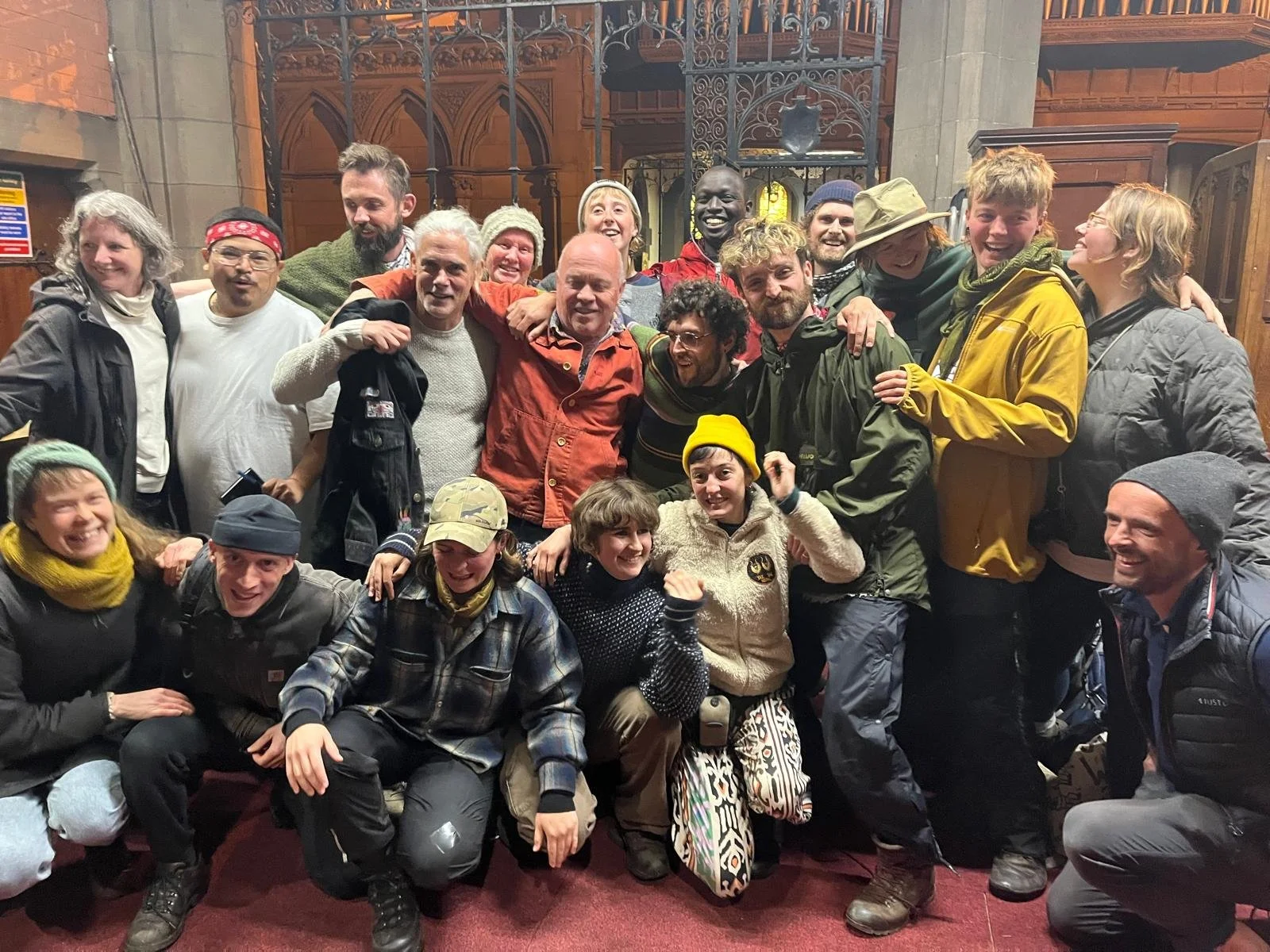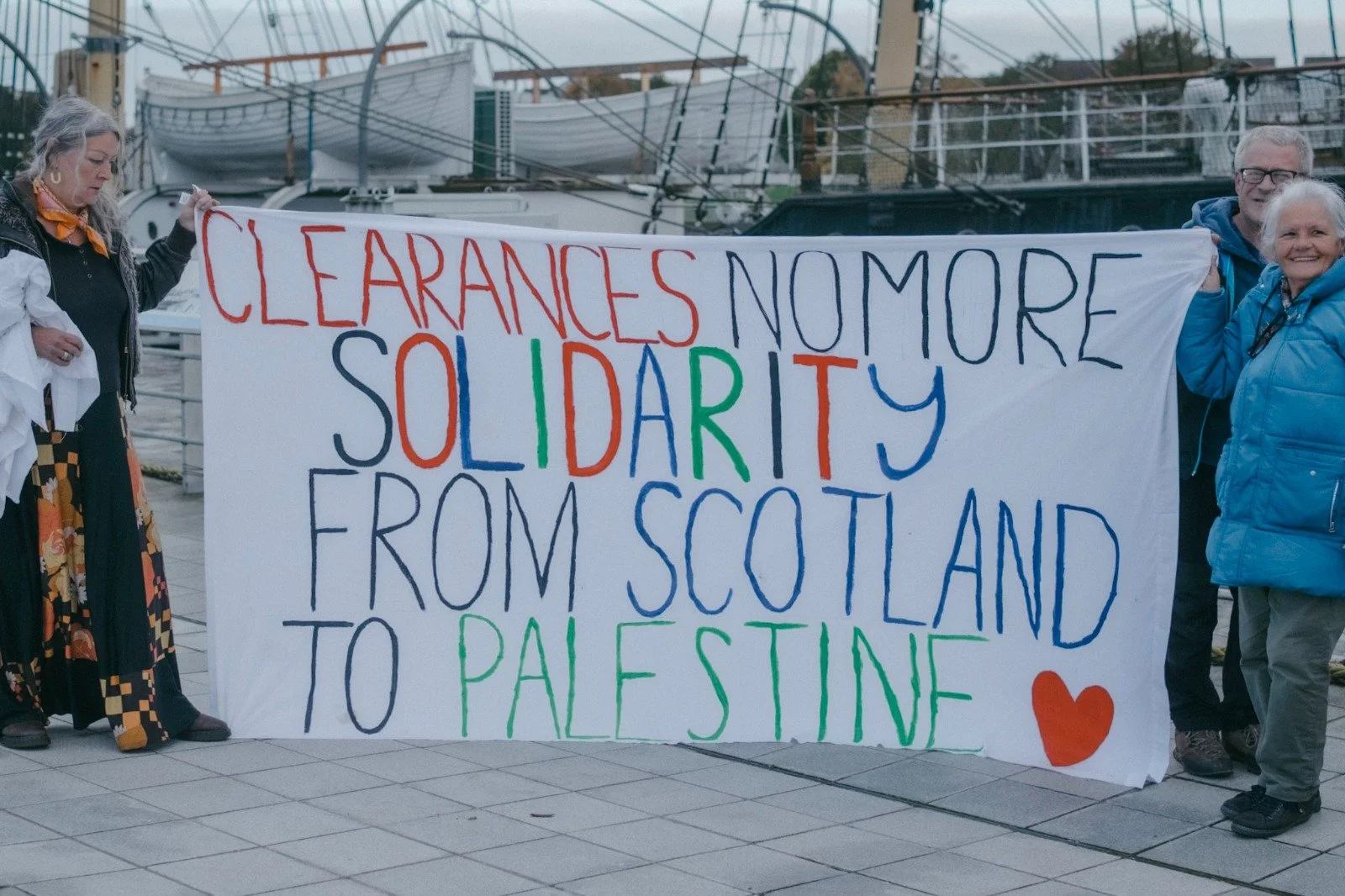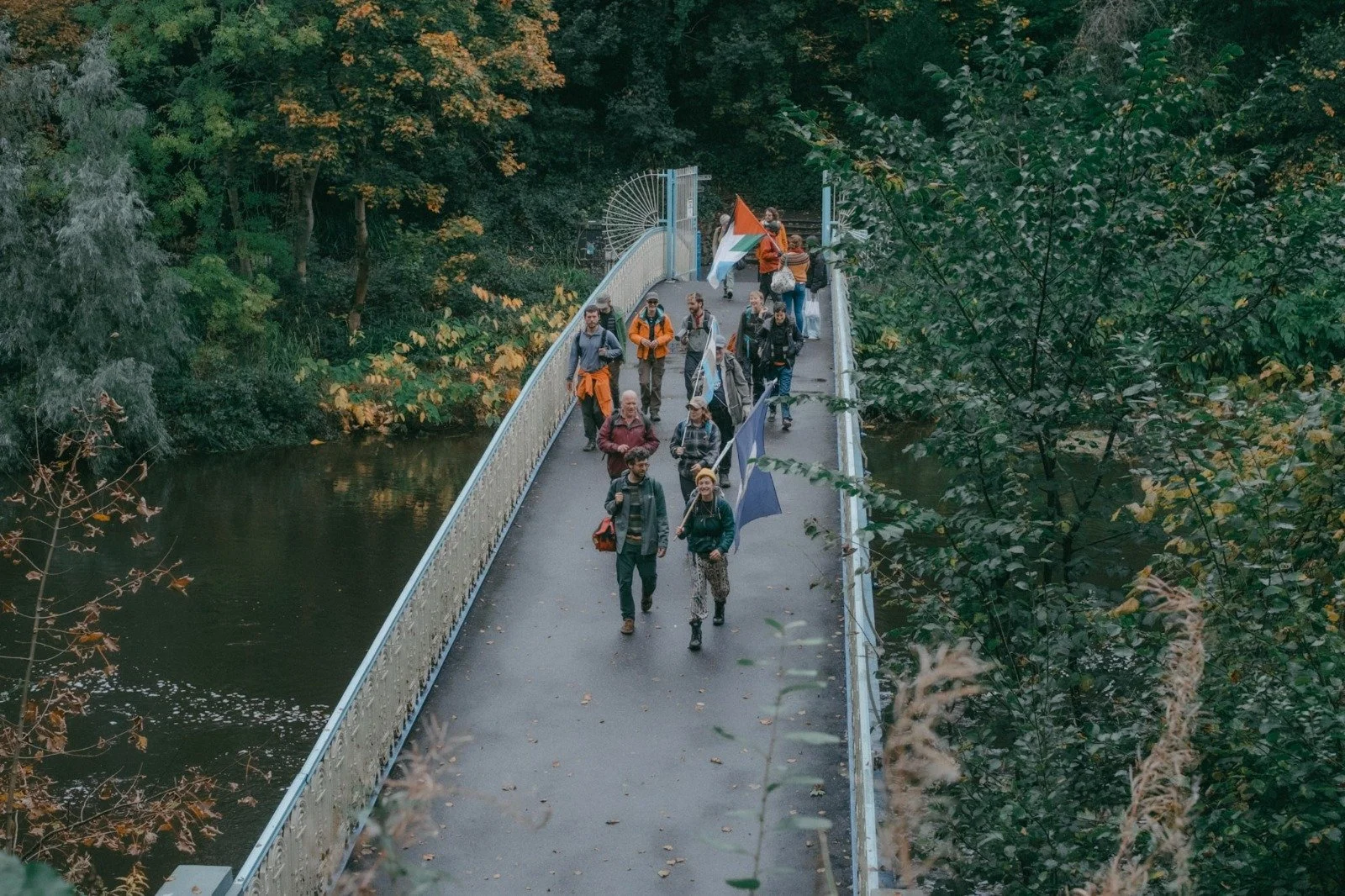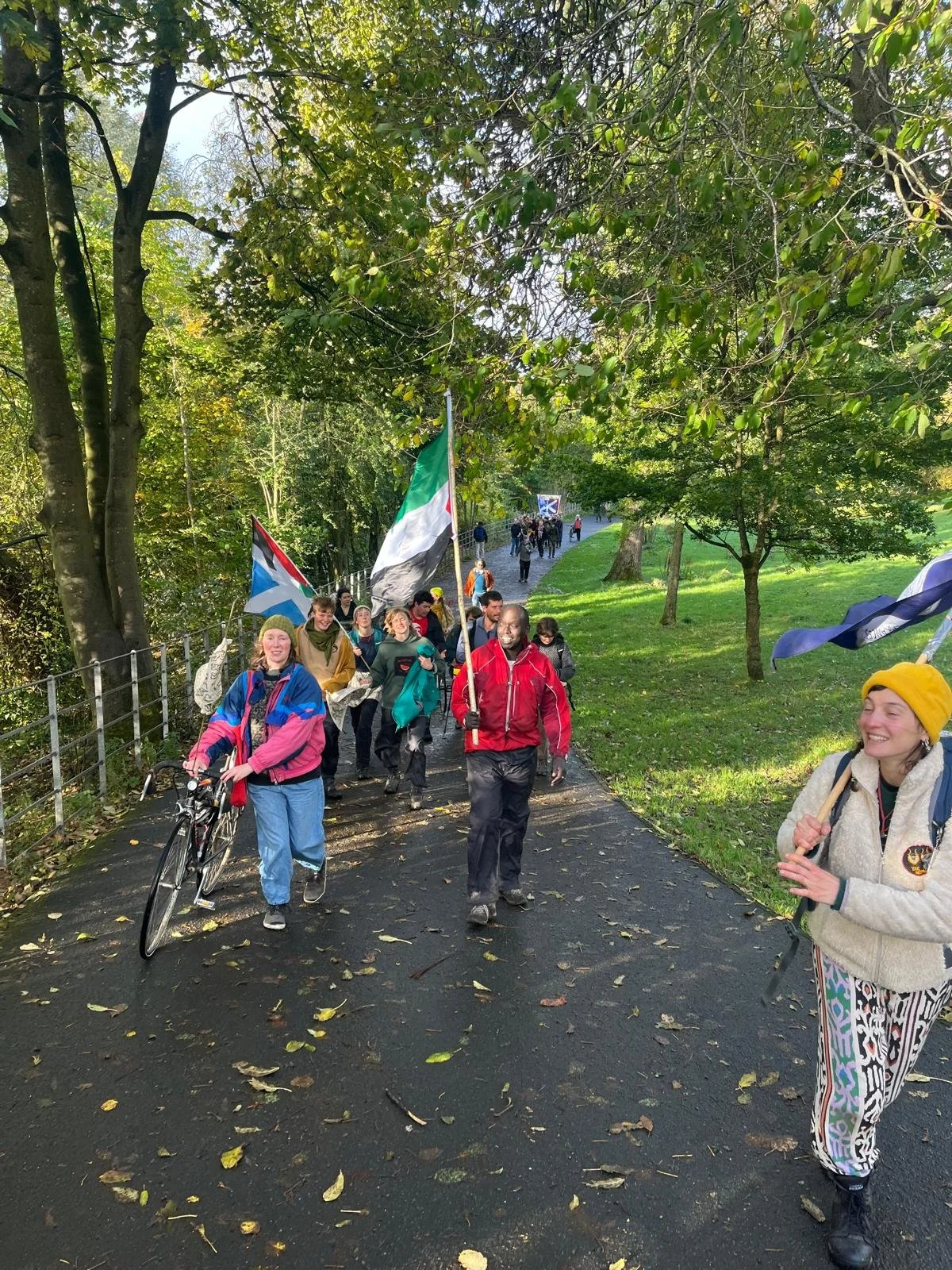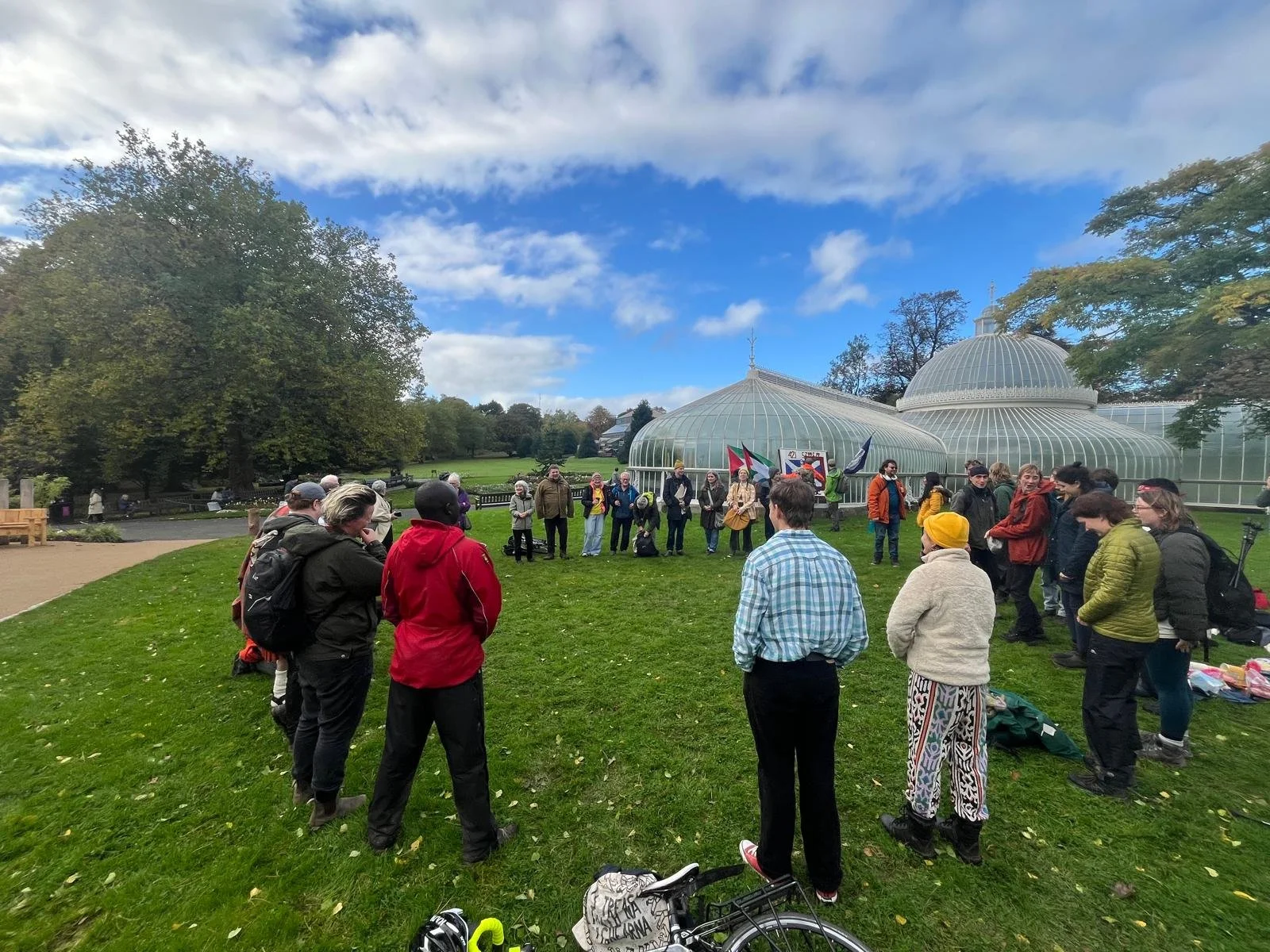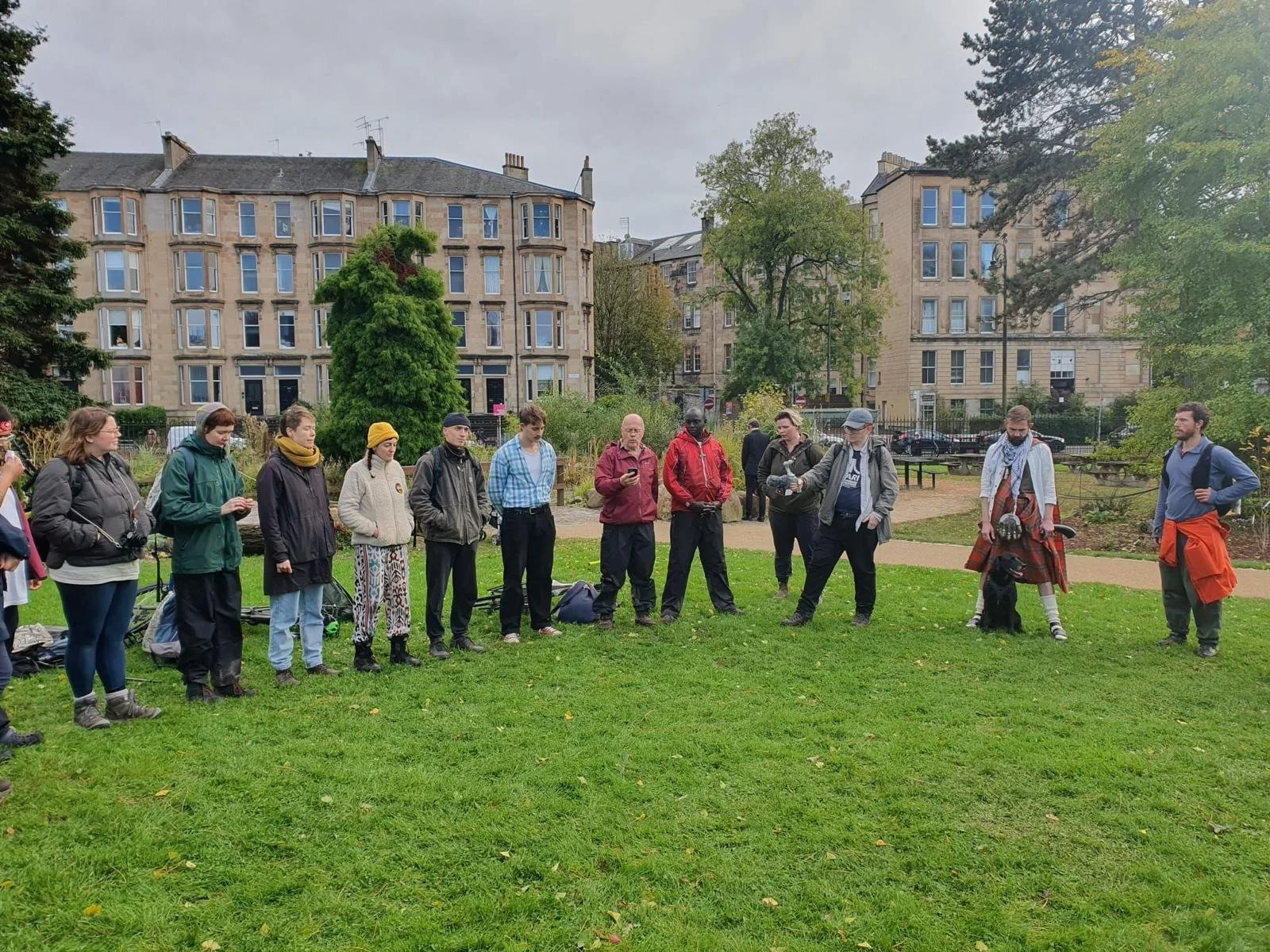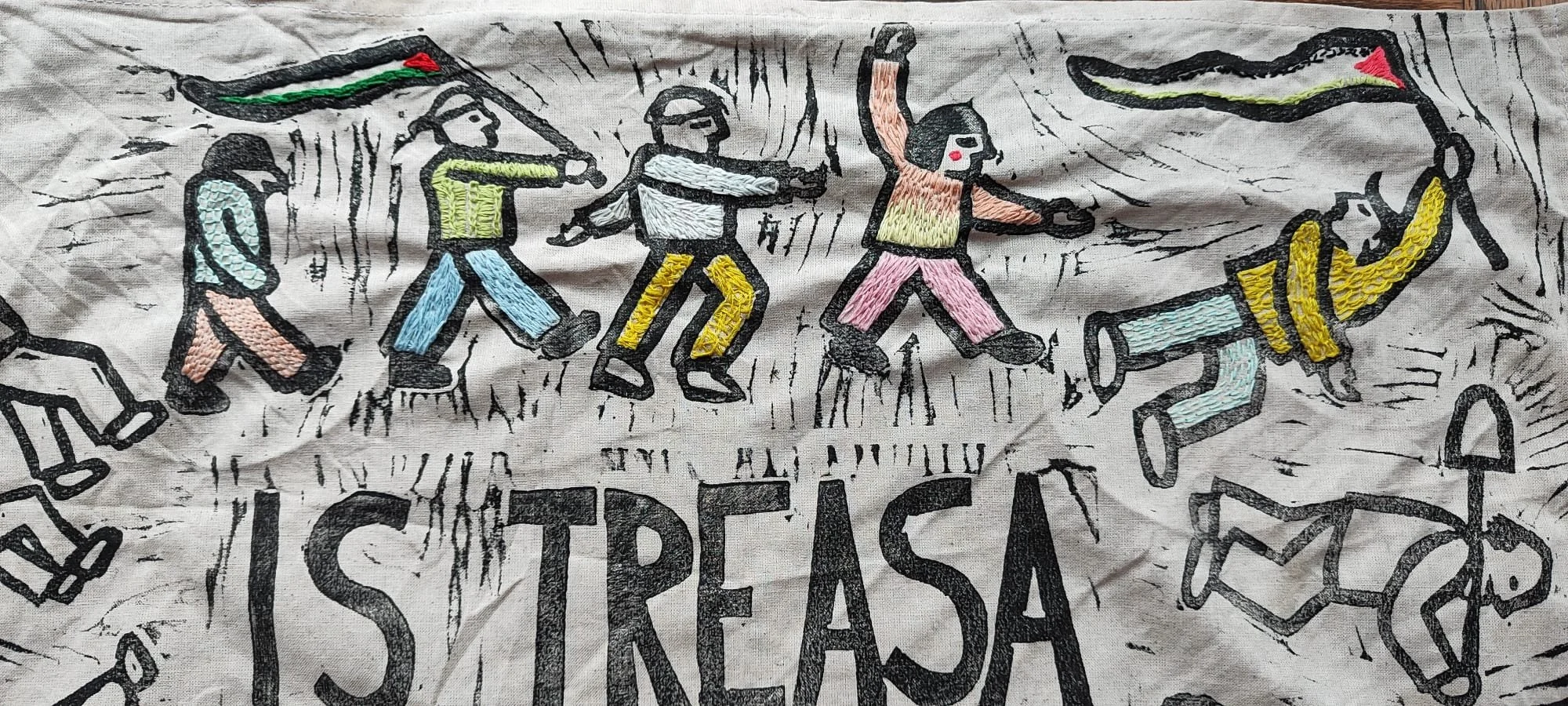CARBETH & GOVAN- renewing resistance
The last days were never ending,
The last days were full of endings
sweet laugher
salt tears
in a shared present
on the precarious edge of no more
Not knowing what’s been sown,
Not knowing what will grow
unexpected as flowering weeds
Day 20 - Balmaha to Carbeth - salmon leap, fire play (13 miles)
This is the last full day that will run into a shared night, and then a morning after of waking and walking.
Ten of us are driven from the overnight campsite at Drymen back to Balmaha by Loch Lomond, where we’d ended our walk the evening before.
We then walk all the way back to Drymen where we eat sandwiches for lunch in the same barn we’d made them in, almost half way from Balmaha to the Carbeth huts, our destination for today.
As we arrived in Balmaha, my son Blue finally gets through to me to say the police came by our flat again this morning to arrest me. This time in uniform.
They had come the day before the walk began.
Now they come the day before the walk ends.
The day before the walk, I’d returned home from buying oats for porridge, to find two plain clothes police on my doorstep waiting for me. I was concerned because of all the equipment I still needed to get hold of to bring on the walk the next day, so I hurried through the process at the police station - “Do you want a solicitor?” “No, I just want this through as fast as possible” - but before that I messaged folk I’d said I’d get equipment from:
“This morning I was arrested and taken to St Leonard’s police station under section 13 of the Terrorism Act for holding a placard saying ‘I oppose genocide. I support Palestine Action’. I’m now back home but I may not be able to pick up the gazebo”.
I’d never met the person I messaged, but they had offered a gazebo for the walk saying:
“My husband’s family were forcibly removed from their Croft in Sutherland at the end of the 18th C. In fact it is documented that Hugh MacBeth was burned alive in his cottage as his son went to Inverness to contest the evictions with Patrick Sellar, the Duke of Sutherlands enforcer.”
Returning from the police station that morning before the Walk, I opened an envelope. It was summoning me for jury service.
Now, on our way to Drymen, there are numerous stops in the rain to pick multiple mushrooms.
After lunch, seventeen of us headed off from Drymen to Carbeth, with another 4 in the support vehicles.
On the way there was - for me - the most extraordinary happening.
It began bizarrely,
After a few miles of walking, we were waiting on the road over an old stone bridge. Waiting for a few who were well behind. I got a bit crochety about some being so slow, and asked why we didn’t walk in two groups so the slow could go slow without slowing everyone down. Ella responded (completely rightly) that we are walking together and we’ll wait for anyone needing us to wait.
After what happened next, I wrote in the group chat:
“The funniest thing is (Ella and Pal will know) I was grumpy about Ben and co being late (without knowing they had a really good reason!) and knew that I would immediately be the last person. Instant karma!”
As everyone left the bridge, the ever-helpful Mike saw a walker carrying a sleeping bag in his arms. The man insisted it couldn’t fit in his rucksack. Mike was concerned and quickly took the rucksack off, fitted the sleeping bag in, and sent him happily on his West Highland way.
Mike and I were now well behind the body of walkers, and were greeted by a man saying “If you want to see the salmon leaping, go though that farm gate to reach that white cottage, then head down to the waterfall”.
We did.
The storm had filled the river to a cascade, making the waterfall impenetrable. Now the salmon were trying again. If not today, then one day soon the waters will subside enough for them to continue their journey from across the Atlantic up to where they were spawned, and to spawn and die and their cycle continue.
When we finally caught up with everyone, it was at a cafe that Kipchumba (our indigenous Kenyan comrade) pointed out only existed because of the West Highland Way passing beside it. He suggested holding a walking assembly for land justice, like this one, in East Africa. Walking from one community to another - learning about culture, land and resistance.
We walk a muddy path through the lowlands. Ahead a forested round hill stands out alone in the flat valley. Being a practical person, Mike says: “Whoever thought the idea of everyone trying to decide what to put on the banner (the night before in the barn in Drymen) was crazy”.
I say: “It was me”. We had all been tired and it was no time to make such a decision, but it was also our last chance to discuss and decide ahead of walking into Glasgow on October 7th. We followed a sociocratic two-stage process that began with inclusive equality - enabling everyone’s input - and then delegated a few people to decide what to put on the banner, and to paint it.
Leyla photo of Wapat painting the banner at Carbeth
As we approach the rounded hill, many of us decide to walk in silence for ten our twenty minutes.
On the way I read a few pages from Wapat’s extraordinary writing. Wapac is an indigenous First Nations walker from the western coast of so-called Canada. His writing fills me with his grief, gratitude and courage.
After the silent walk reading Wapat’s words, I see the earth flag ahead up a small hillside, and arrive to find Ben sitting in silence, and Alec filming a fairly house to his right. Bec, Gab, Skye, Mim, Kim, and Pal arrive, having tried to reach a standing stone below the tree-full rounded hill, but stopped by cows in what Mim calls a sacred landscape.
We pass through some sweeping lowland hills and parkland woods.
We come across a poster for this evening’s Fire Play in the community of Carbeth huts, The wet poster is almost unreadable, but augurs well.
Under the pouring rain we curve through the paths that wend between the spaced out huts. Entering the community hut, wonderful hot food awaits us and we scuttle to retrieve bowls from our rucksacks piled up sodden and dank in the vans. Tonight there is no need to get the huge gas burners out to cook.
A joke is made about our not having walked enough, as we all head outside with wizard white light sticks to watch a walking performance where David and the Red Flag Players tell stories of Glasgow, Carbeth and resistance.
Then back into the community hut, where we cram in for the fantastic Red Flag Players’ ‘Fire play’. Watching the faces of hutters listening to their own story - as if (it felt to me) for the first time - recognition dawning, rebellion renewed, and us all - hutters, walker’s old and new, and well wishers - listening to the story from Torry told by Natty so clearly, so engagingly, so well, and also to the Dundee storyteller with her 9 daughters being eaten by a dragon, and the lighting giving her 4 scary gesticulating arms as she spoke.
In the late evening, I’m delighted to joke with Maisie who is maybe 12. Can every shift of age be the gaining of a new ring to the tree? If no ring vanishes, and all ages persist, can relating to all ages persist? Maybe.
Day 21 - Carbeth to Govan - a river flowing (15 miles)
The next morning, 25 of us gather in a ragged circle in the hutters common hut at Carbeth, preparing to leave for the last day’s walk to Milngavie, then on - first by road and then beside the Kelvin river - to the Clyde.
In the hut Kipchumba, from Kenya, spoke of two things.
The first was the old story of the man relaxing by the water having caught a fish and met his needs; and the rich man coming and telling him to work hard to build up a business which at the end of the day would mean a huge amount of work for what? To be able to simply do what he can already do: sit by the river and relax.
The second thing Kipchumba spoke about was much more challenging.
He spoke of Chelagat Mutai, a Kenyan woman who became an MP in the 1970s or 80s. She fought long and hard for people to have their land returned to them, and had to flee into exile. Returning, she was sent to prison and hard labour - and in the end was a broken woman, defeated by the system. And Kipchumba’s point was that even if in the end we are each broken by the system we are up against, we still need to fight for the things we may never see, so that our children or our children’s children may.
I remember how much torture there has been over the centuries, how many centuries of struggle there can be in any place, I remember reading of a British colonial soldier who loved nothing better than to smash at Kenyan freedom fighters (Mau Mau) prisoner’s skulls until they broke.
This morning, when Kipchumba told this story, it echoed so strongly Wapat’s words from yesterday. Words that were about keeping the spirit while so many succumb to the killing machine that kills culture, kills collective power, kills spirit, kills our connection with each other, with the spirits of the land, and the land itself.
Yet. We are the earth.
We are nothing less than the earth.
If we act on that truth, on the extraordinary truth that we are alive at all,
can we be springs bubbling up out of the ground?
can we let ourselves flow, and flow together?
can we make an unstoppable river that receives the sky, restores the land, and reaches the sea?
Setting off, the walkers soon stop at the Craigallian fire place.
The fire place is by Craigallian Loch, and marked by a monument erected where - between the world wars - folk would gather to tell stories in their break from work or unemployment in Glasgow, often as they prepared to head to the Highlands, to fight Franco, or respond to yet another injustice.
Two of Leyla’s photos of the place where the Craigallian Fire monument
Before the day’s walk began, I’d suggested that we take wood down and relight this ‘eternal flame’. That caused slight panic because today’s walk is long and we’ve promised folk we’ll reach the Botanics at 3.30 so they can walk the last hour with us down the Kelvin river to the Clyde.
Later, a friend whose father was central to the Craigallian fire and who helped erect the monument, reads an early version of this day’s write up where I suggest the monument to the fire prevents it now being lit, and writes that he is irritated by my “highhanded dismissiveness”, and the fact that I know . . .
“. . . exactly nothing about the background, and the considerations (including the then landowner's willingness to allow the hutters to build & keep their huts, when he could have had them evicted in the early days, up to and after the convalescent encampments after the Clydebank blitz)”.
In comments that relate to words spoken below in Glasgow, he adds
“I thought Eva's comments were very good. McGilchrist says we've had 3 great divorces in modern times: from nature, from each other, and from the sacred. So her description touched me”.
And in comments that speak to the danger of looking far away to avoid what is near at hand, he ends:
“I remember Jimmy Reid at the time of Allende, on a march in Glasgow, saying at the end (words to the effect); "Aye, it's great you're all here waving flags. About a' that stuff on the other side of the world. Getting all worked up. Something good about that, right enough. But just remember the worst slums in Western Europe are about a quarter of a mile away from here. So. If you want to get your sleeves rolled up about something, there's something. And you don't need any flags.”
23 walkers walk on into Milngavie, and stop for a lunch break.
As we munch sandwiches by the play park, the low wall around it means I can dip a flag to meet small kids faces as they spin round in metal spinners, and talk with ‘old guys’ whose dad’s also fought in the Second World War and can’t believe what Israel is doing to Palestine with UK Government backing.
Then we walk the pavements and the suburbs, and are soon down by the Kelvin river where we walk past three huge hills of rubble. Ben explains that these were once three ‘perfectly serviceable’ high rise flats. Folk battled to save them, but in the end the developers (in cahoots with the politicians) had their way, and the homes were demolished to make way for expensive riverside-properties. Clearances. Evictions. Now.
We are walking the last hours now.
A walk that became a living community with fellow walkers and those we meet, including eagles, salmon, rainbows, mushrooms, trees, crows and minke wales.
The walk felt like we entered mythic time, like we opened a gap, found a thread that can pull a string that can pull a rope. Can we continue and deepen this? Or is it a fleeting moment, soon gone?
I tell someone that, for me, the walk feels like ‘living anthropology’. When anthropology is alive, it is not colonial ‘objectivity’ or paralysing relativism. It is actively engaging with and valuing others, and objecting when anyone does not value others. Such a ‘liberation anthropology’ asks: “Are we in good relation? If not, how shall we restore good relations?”
Reaching the Clyde, we gather between the futuristic transport museum, a huge old sailing boat, and the bridge to Govan. On the way we have become a sizeable crowd. On the outskirts of our singing or listening, there are young boys in black on bikes who Ben engages. We sing ‘The Freedom Come all Ye’, singing of a hoped-for fought-for world where we have restored the valuing of all as equals, have restored good relations.
We walk on towards Govan, and the extraordinary 9th century Viking tombstones in Govan old parish church: arched like the salmon were, leaping into the next life.
There is tea and coffee, and there are banners and waiting and talking.
Leyla Mclennan’s photo
Finally, walkers, well-wishers and locals gather and listen to David telling the history of Govan, its part in Empire and its resistance to Empire. We join in with the Irishman and his kids singing about Mary Barbour and Govan’s resistance. We hear Alastair MacIntosh talking of the Walk having been a cultural, psychological and even spiritual journey, and concluding this pilgrimage in this ancient sacred site. We hear Annie’s inspiring stories, and Wapac’s recordings of his brothers, accompanied by his own speaking and his profound tears, and then we hear Ali’s extraordinary Gaelic singing.
Finally Skye and Beck sing their friend’s song “In the land of no prisons” where “We bring the clocks down” - a land where isolation is ended and clock time no longer rules us.
from ‘Singing for justice on land and sea’
Govan old parish church is an extraordinary ending.
At the same time, the stone of the church seems to cut me off from the earth, from underlying equality.
I mention this to the Dundee Storyteller (I must remember her name! We all have names!) and she tells me she loves stone.
I say that if it was a stone circle or a long barrow then yes I love stone too. Maybe it’s too many days spent in churches, and what the lovely Irish singer said when we couldn’t hear David at the pulpit, all of us sitting in semi-circular rows of church wooden seats. We couldn’t hear because there was suddenly the roar of a heating machine behind us, filling the space (and me imitating being a dragon roaring its noise). The Irish singer stood up behind us midst the roar and said “Don’t worry. This is totally the experience of being in church. Some man up the front speaking at us for an hour, and us listening and not understanding a word”. It was funny, and fair enough, and unfair enough given the profundity of what was being shared - including through his own song. Just as my being judgemental about a stone church probably made a fair point and missed a thousand.
There had been many beginnings to the walk.
Each beginning from our own place in our own way for our own reason.
And there were many endings to the walk.
There was that ending at the old parish church, that itself ended with Jack proposing a circle that swiftly turned into Auld Lang Syne. A circle that fulfilled or outflanked the lines of chairs. And then Kipchumba wanting me to take his photo with Gabs, Skye and Beck, and an Indian woman insisting on taking my phone so I could be in it too. Then so many walkers being pulled in, or piling in, until maybe all walkers who were there that evening were in it. Then there was throwing birthday boy Manu in the air, and the ending after that that was 18 of us walkers round for an ‘empty’ at Annie’s - Annie of the wonderful smiling eyes, 73, and a kindred fighting spirit.
At Annie’s, folk had gone out to get pizza. I arrived late because I’d been on the phone to Eva who today learnt from the hospital doctors that her 87 year old dad - lying unconscious in a hospital bed - has an aggressive cancer eating away at his pancreas and liver, and won’t last beyond hours or days. She is so tender. She is in her dad’s house with all his photos and books and objects from different decades of life. I remind her of the boys, of this wider web of relations, of life, that can sustain her, and that will welcome him back into itself.
Eva missed the last few days of the walk to be with him, and I have missed her and the insight she’s gained - including through what she’s learned about how to make groups safe enough for everyone to speak in, everyone to be equally valued in, everyone (and therefore our ‘we’ nature) to be heard. The pearl of wisdom of inclusivity, grown from the grit of her earlier feelings of being excluded, alone, unable to feel at home in groups.
There was the ending that was singing Hamish Henderson’s ‘Freedom Come All Ye’ at the bridge over the Clyde, and Ali the wonderful Gaelic singer (who later sang to us in the church) joining us with her wonderful voice, her knowing all the words, and her bringing the banner of solidarity that Wapac and David and others had made in Carbeth that morning, that said “Clearances no more. Solidarity from Scotland to Palestine”.
And just behind and beyond that banner there was Ben talking with the young boys in black on their bikes, boys who were anti-immigrant and probably saw a bunch of (what they thought were) middle class do-gooders who could afford their consciences. Another time, would we instead turn our focus on them? If so, how? Create a cycleway between us and see if they could navigate it? Would that be tokenistic or a step towards inclusivity?
There was the ending that was walking down the Kelvin river to the Botanics and then to the Clyde, gathering people and banners as we walked.
Leyla Mclennan’s photo
Not marching down streets, but wending our way by the water we have walked by and through and with from the islands and the highlands down to here where we see the city above and around us, almost out of sight of us, as we walk our way to the Clyde where so many folk from so many communities who were broken, were taken and shipped and used to break and clear communities elsewhere in the world from their land.
There was the ending that was the circle at the Botanics. And my son Blue turning up out of nowhere. His presence filling me with joy, and standing beside me as we all make a circle holding hands.
I read out the reflections Eva wants to share, where she writes:
“I so hoped I'd be able to do this last part of the walk with you, but we're still waiting to hear from the doctors about my dad who's remains very ill, and I can't leave without getting some sense of what their next steps will be. So I just wanted to send a very short reflection on the walk, if there's a moment to share it.
“I was really struck by a deep shift that happened for me - and maybe for others - somewhere around a week into the walk. Prior to that, I was operating within an emotional range that was familiar to me. I was pleased and interested to meet people, a bit judgmental at times and sometimes working hard with familiar old internal patterns around feeling left out, or feeling I was getting the balance wrong between taking care of others and making sure my own needs were met.
“I didn't exactly wake up feeling different one day - or maybe I did but just didn't notice at the time - but somewhere around a week in I suddenly noticed that I'd been feeling different for a while: I was just aware of loving everyone on the walk hugely. I don't know where it came from or what caused it, but it was a profound shift into a heart opening feeling of connection and togetherness. All my previous internal chatter settled down, and I just felt a huge appreciation for each person - and for 'us' as a group. I'm really interested to know whether there was something similar for others, but it feels like there probably was.
“Before the walk, the organising group thought a lot about the kind of culture we wanted to try to foster in the group. Whether or not that work contributed to what we made together, for me, our shared culture couldn't have been better. It felt like a shift from being just a bunch of people doing something together, to feeling like we were together - doing whatever we were doing - walking, talking, making porridge, designing banners, singing songs, treating blisters, setting up, taking down...
“I’m sure there were multiple factors that made this possible, but there are two that stand out for me.
“One was time - it's incredibly rare to have that much exposure to other people all working towards the same thing - it overrides the habitual boundaries we have when we're working together - like the end of a zoom call, or going home at the end of the day, and requires us to find new ways to relate. That transition can be uncomfortable, but I think that feeling of togetherness is on the other side of it.
“The other one for me, was being outside, on the earth. Most people I know (including me!) spend a lot of our time trying to keep separate - from the rain, the cold, the ticks, the hard ground - and that, along with the many distractions made for us by capitalism, means we don't have much space to experience just living in the environment.
“One of the things the very diverse indigenous cultures around the world have in common is their insistence on the importance of the planet, not just as the basis for our survival, but as an active, interactive presence that takes care of us as we take care of it. My sense is that some of the feeling of 'us-ness' that we fell into, came from being more and more in the direct presence of our mother earth, so we began to directly experience the deep energetic support she brings to those who live in community, not separating themselves from her.
“Whatever the reasons, my experience of this walk, these people, this land have been transformative and I'm hugely grateful for the experience and for the connections I made to each of the people I met.
“My hope is that having experienced the power of our connection to one another and to the land, we will find the inspiration and strength to take our next steps in this journey towards reclaiming our full humanity - which always has been, is, and will be in loving connection with each other and the land.”
I briefly add:
“The land, the sky, the waters - this earth is who we are. These bodies of ours, they are the earth. If we can feel and speak and act from that truth then we are available to the enormous power that will shrug off and destroy these puny domination systems. Whether we are shrugged off too, or whether we are part of the earth shrugging them off, either way those systems will be gone and we the Earth continue.”
There were many beginnings to the walk. Not one.
There were many walkers walking. Not just this one.
There were many endings to the walk. And there are none.

